Alabama Documents
Quitclaim Deed
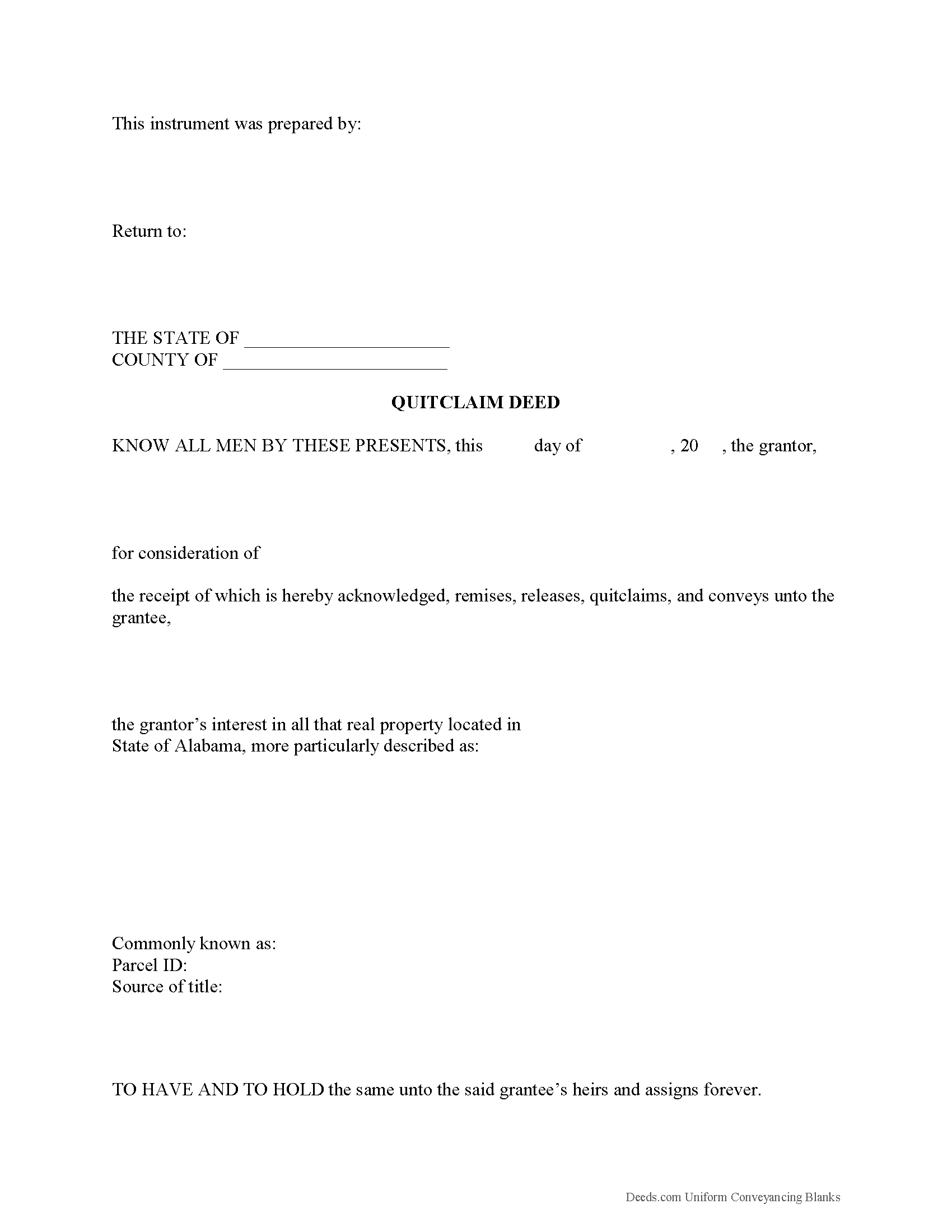
Alabama Quit Claim Deed Form: Detailed Legal Requirements
Content and Format:
Form of the Deed: According to Ala. Code 35-4-20, the quit claim deed must be on a tangible medium like paper or parchment. While traditionally 'written,' in modern practice, this includes typed or computer-generated documents, as long as they are physically printed.
Signatory Requirements: The deed requires the signature or equivalent mark of the grantor or an agent authorized by them, as stipulated in Ala. Code 35-4-20.
Grantor Information: Essential details like the grantor's name, address, and marital status must be clearly stated (Ala. Code 35-4-20).
Marriage Considerations: For properties owned individually by one spouse, only that spouse's signature is necessary. However, Ala. Code 35-4-20 mandates both spouses to sign if the property is a designated homestead.
Homestead and Non-Homestead Provisions: Non-homestead property transfers need a statement clarifying that the property is not the grantor's homestead.
Detailed Property Description: A full legal description of the property is required, including references to prior recordings, as per Ala. Code 35-4-20.
Grantee Details: The deed s... More Information about the Alabama Quitclaim Deed
Gift Deed
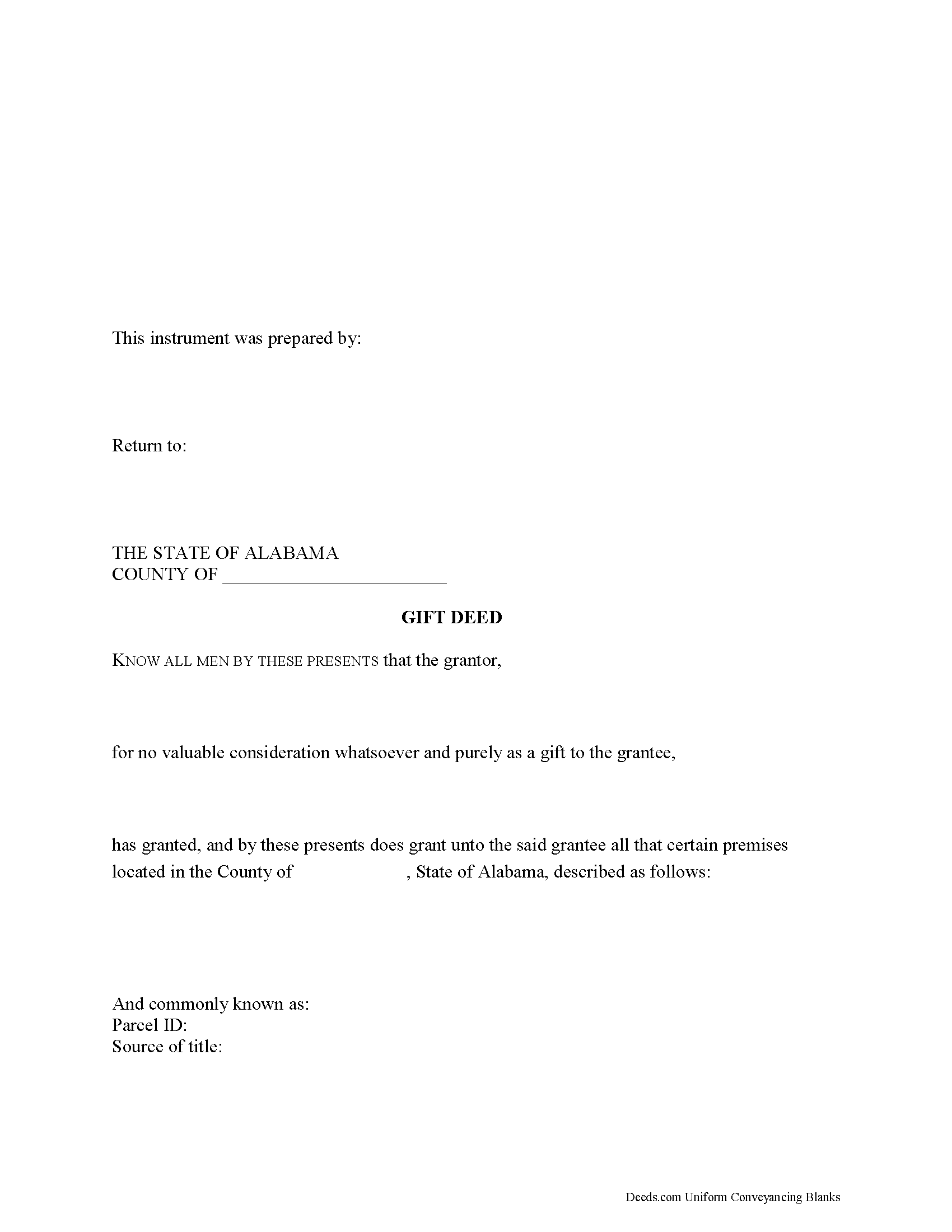
Gift deeds convey title to real property from one party to another with no exchange of consideration, monetary or otherwise. Often used to transfer property between family members or to gift property as a charitable act or donation, these conveyances occur during the grantor's lifetime. It is important that a gift deed contain language that explicitly states that no consideration is expected or required. Ambiguous language, or references to any type of consideration, can make the gift deed contestable in court.
A lawful gift deed includes the grantor's full name and marital status, as well as the grantee's full name, marital status, vesting, and mailing address. Vesting describes how the grantee holds title to the property. Generally, real property is owned in either sole ownership or in co-ownership. For Alabama residential property, the primary methods for holding title in co-ownership are joint tenancy and tenancy in common. The primary characteristic of joint tenancy is the right of survivorship. In Alabama, the right of survivorship is not presumed and must be specified in the form of the deed (Ala. Code 1975, 35-4-7).
As with any conveyance of realty, a gift deed requi... More Information about the Alabama Gift Deed
Warranty Deed
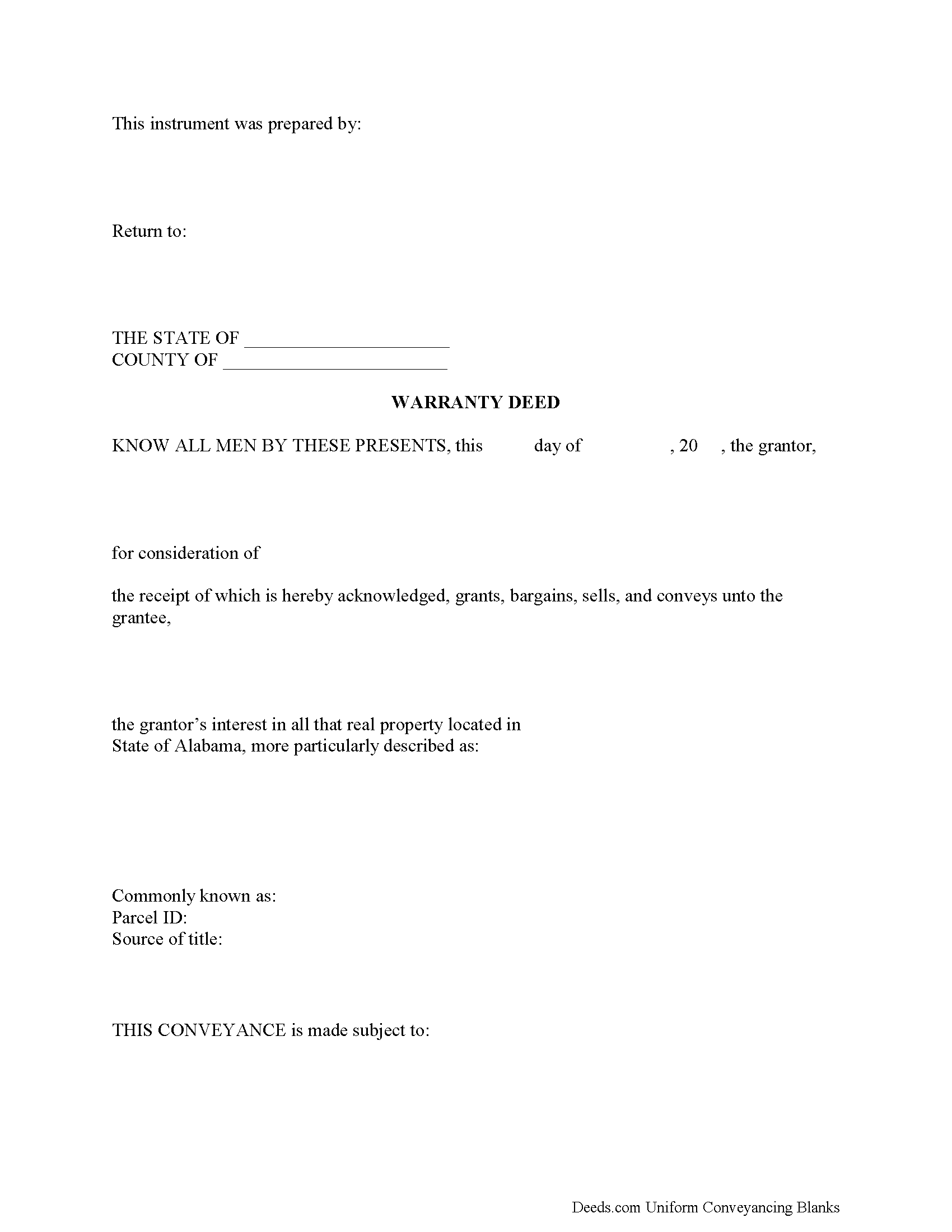
A conveyance of real property or of interest in real property in Alabama is required to be in writing and must be signed at the conclusion of the document by the granting party. The execution of a warranty deed must be attested by at least one witness or, if the party cannot write, by two witnesses who are able to write (35-4-20). A proper acknowledgement will satisfy the witness requirements listed in 35-4-20.
A general warranty deed in Alabama contains covenants that the grantor will warrant and defend the title against the lawful claims of all persons. Additionally, this type of deed includes a covenant of warranty that runs with the land. A warranty deed in this state can also be created for joint tenants with a right of survivorship.
In an Alabama special warranty deed (or statutory warranty deed), the words "grant," "bargain," "sell," or either of them, are construed an express covenant to the grantee, his heirs, and assigns, that the grantor was in possession of an indefeasible estate in fee simple, free from any encumbrances done or suffered by the grantor except any reserved rents and services, and also for quiet enjoyment against the grantor, his heirs, and assigns,... More Information about the Alabama Warranty Deed
Special Warranty Deed
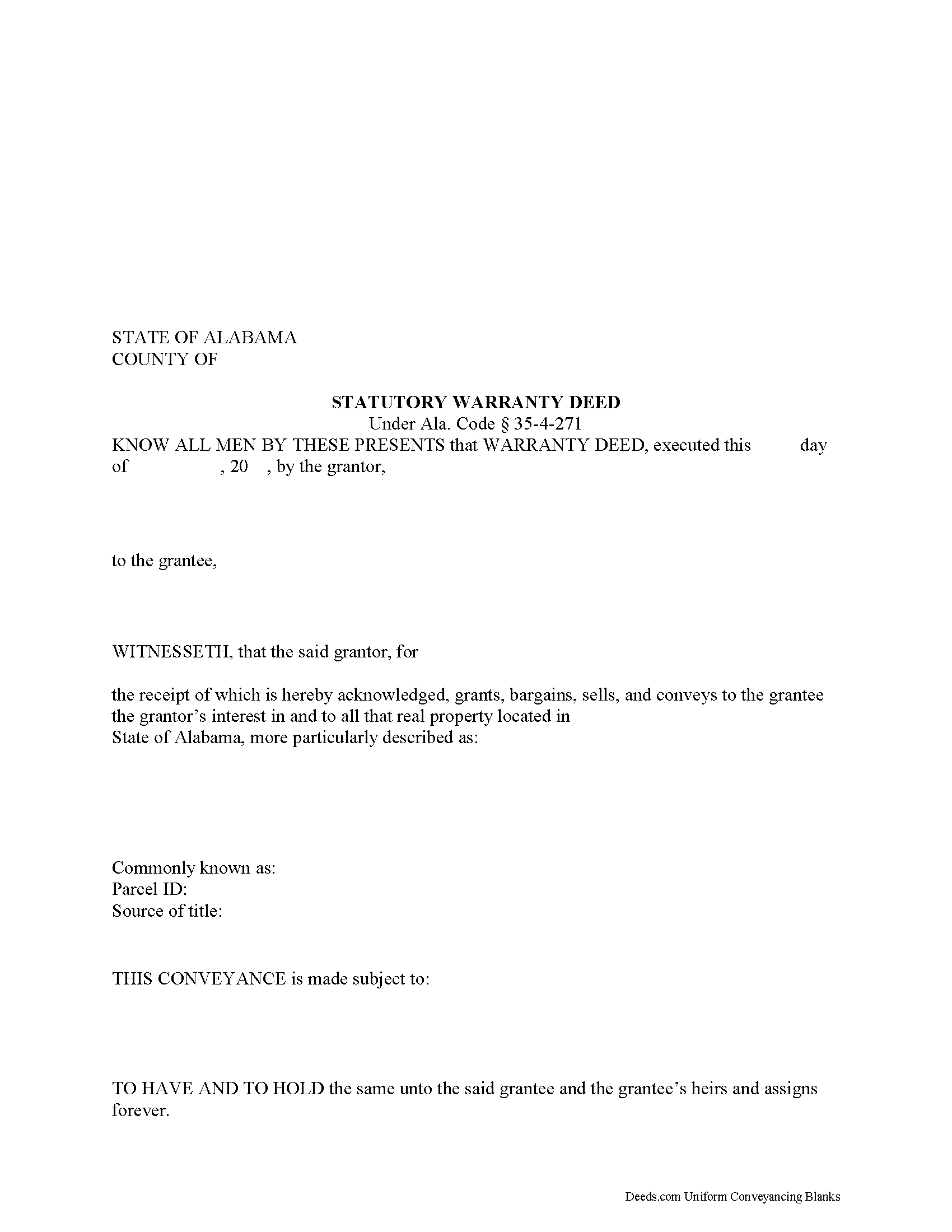
Special warranty deeds transfer title to real estate from the grantor (owner) to the grantee (buyer), with a guarantee that the grantor will defend the grantee against any outside claims to the title that originate from the time she owned the property, and that all restrictions, limitations, and/or obligations associated with the property are disclosed on the deed. They offer a compromise between a full warranty deed, which requires the grantor to defend the title against ANY claims from before the grantee took ownership, and a quitclaim deed, which offers no protections whatsoever.
Valid special warranty deeds identify the parties by full name, marital status, and address, the property's legal description, physical address, the signatures of all grantors and spouses, and a notary acknowledgment. They must also meet all state requirements as set out in Section 35-4 of the Code of Alabama, and any local standards for form and content.
Alabama law demands that all deeds must be recorded (35-4-50). This provides notice of the change in ownership to the public. Record the signed and notarized deed at the office of the probate judge for the county where the property is located.
... More Information about the Alabama Special Warranty Deed
Grant Deed
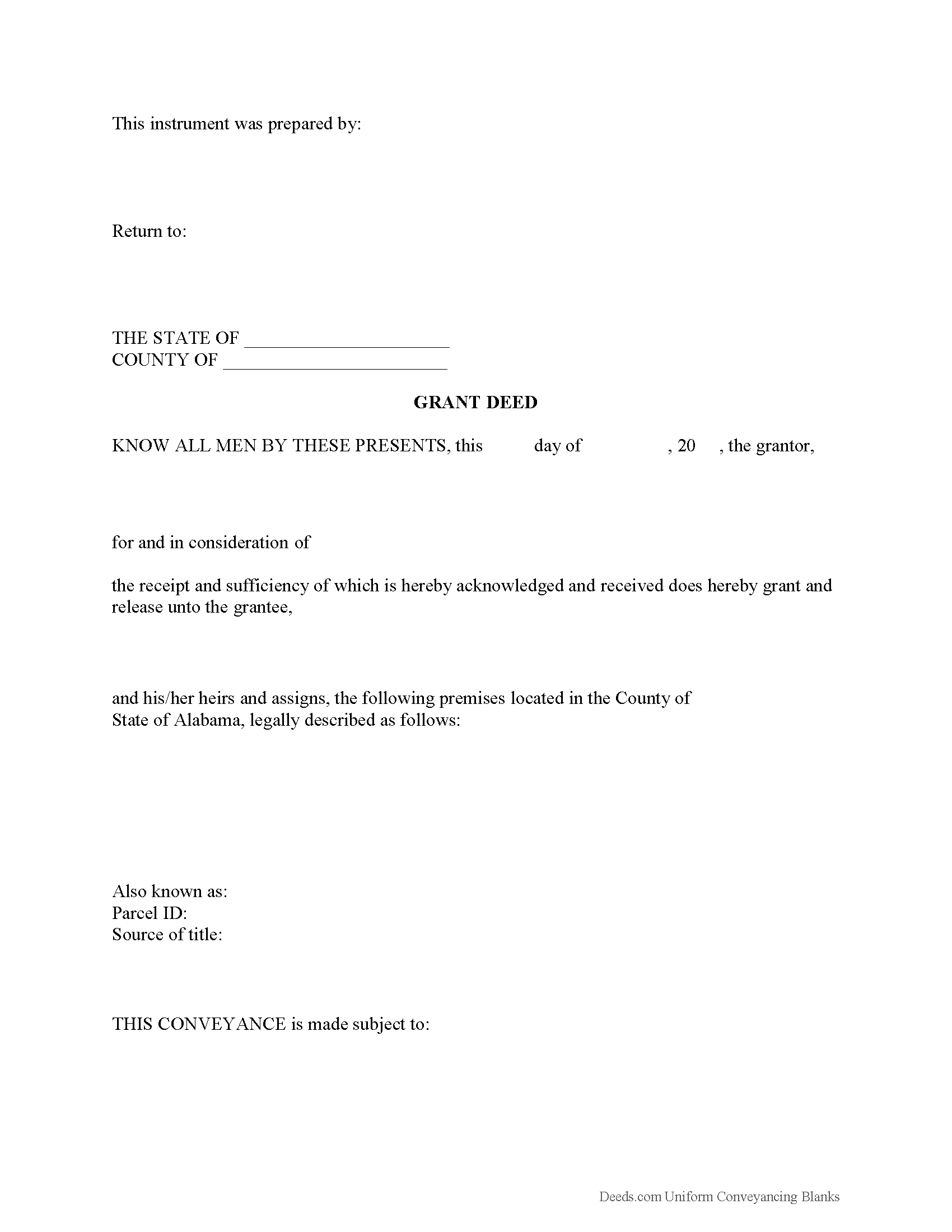
A grant deed, as a type of conveyance used in Alabama, is required to be in writing, and must be signed by the grantor. The execution of a grant deed should be attested by at least one witness, and if the party cannot write, by two witnesses who are able to write. However, a proper acknowledgment can take the place of witnesses (35-4-20).
Grant deeds are not mentioned by name in the Alabama statutes, but the deed is still in common practice in the state. A grant deed transfers property ownership from a grantor or entity to a grantee or entity. In this type of deed, the grantor promises that he/she has not transferred the title previously and that there are not any encumbrances, other than those that may be stated in the deed. In addition, a grant deed will pass after-acquired title.
A grant deed is inoperative and void as to purchasers for a valuable consideration, mortgagees, and judgment creditors without notice, unless the instrument has been recorded before the accumulation of the rights of such purchasers, mortgagees, or judgment creditors (35-4-90). Grant deeds are recorded in the office of the judge of probate in the county where the property is located. Recording se... More Information about the Alabama Grant Deed
Interspousal Transfer Grant Deed
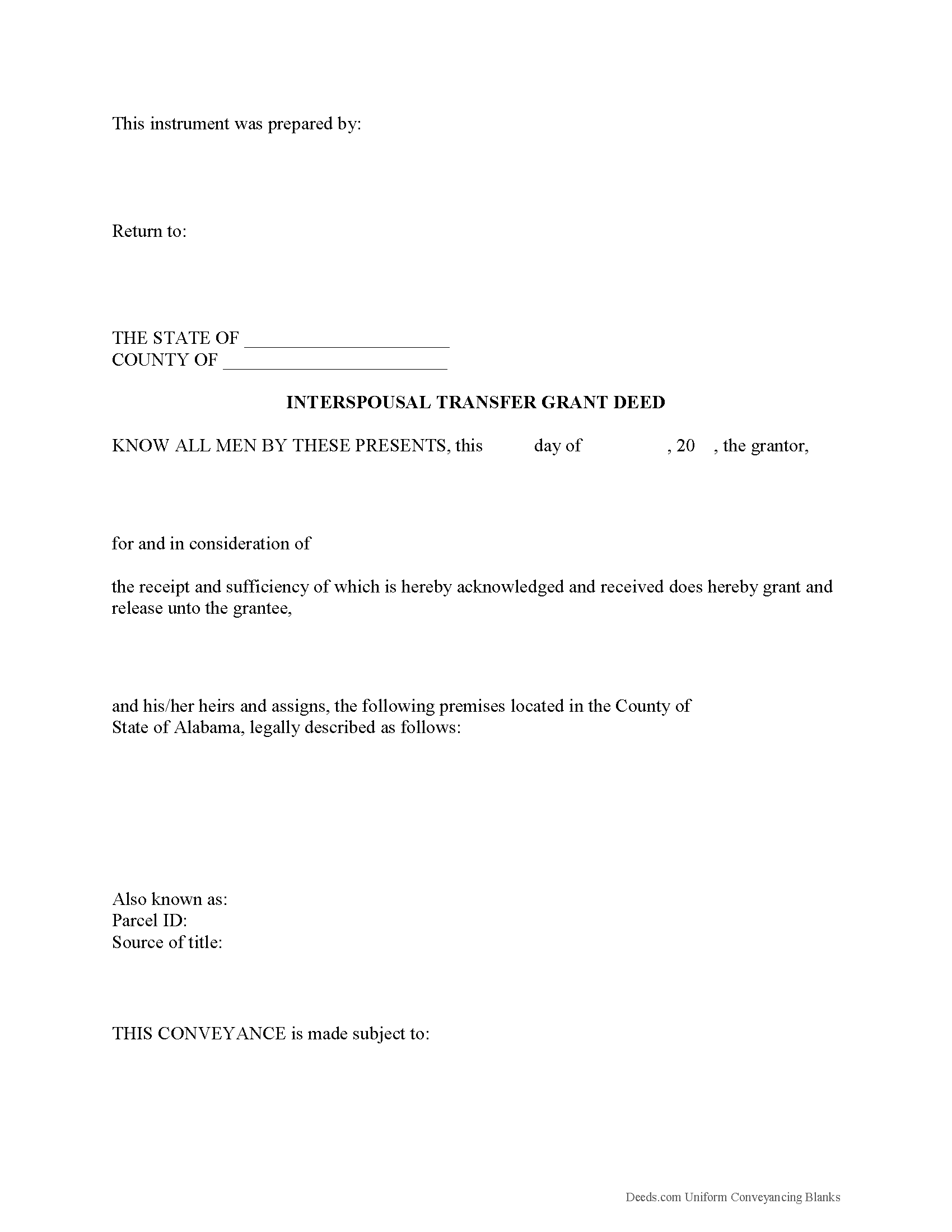
An interspousal transfer grant deed is a legal document used by a married couple who owns real property together to voluntarily transfer one spouse's interest in the property to the other [1]. A grant deed guarantees that the grantor (owner) has a present interest in the property, and formalizes the transfer of that interest to the grantee (the recipient). It also guarantees that the property is not encumbered by any undisclosed liens or restrictions, which in turn means that there are no legal claims to the title by third parties. Depending on the circumstance, the transfer of property is either contractual, by gift, or a change in legal title.
This type of deed is most commonly used during a divorce, where one spouse is awarded sole ownership of the property. In some cases, an interspousal transfer grant deed can be filed when a couple would like to refinance their home, and one spouse has poor credit. Sometimes, lenders will ask one spouse to file this type of deed removing him or herself as an owner if the other is borrowing money so that the former cannot claim any of the recovered debt from a foreclosure sale.
No matter the circumstance or the instrument chosen to exe... More Information about the Alabama Interspousal Transfer Grant Deed
Correction Deed
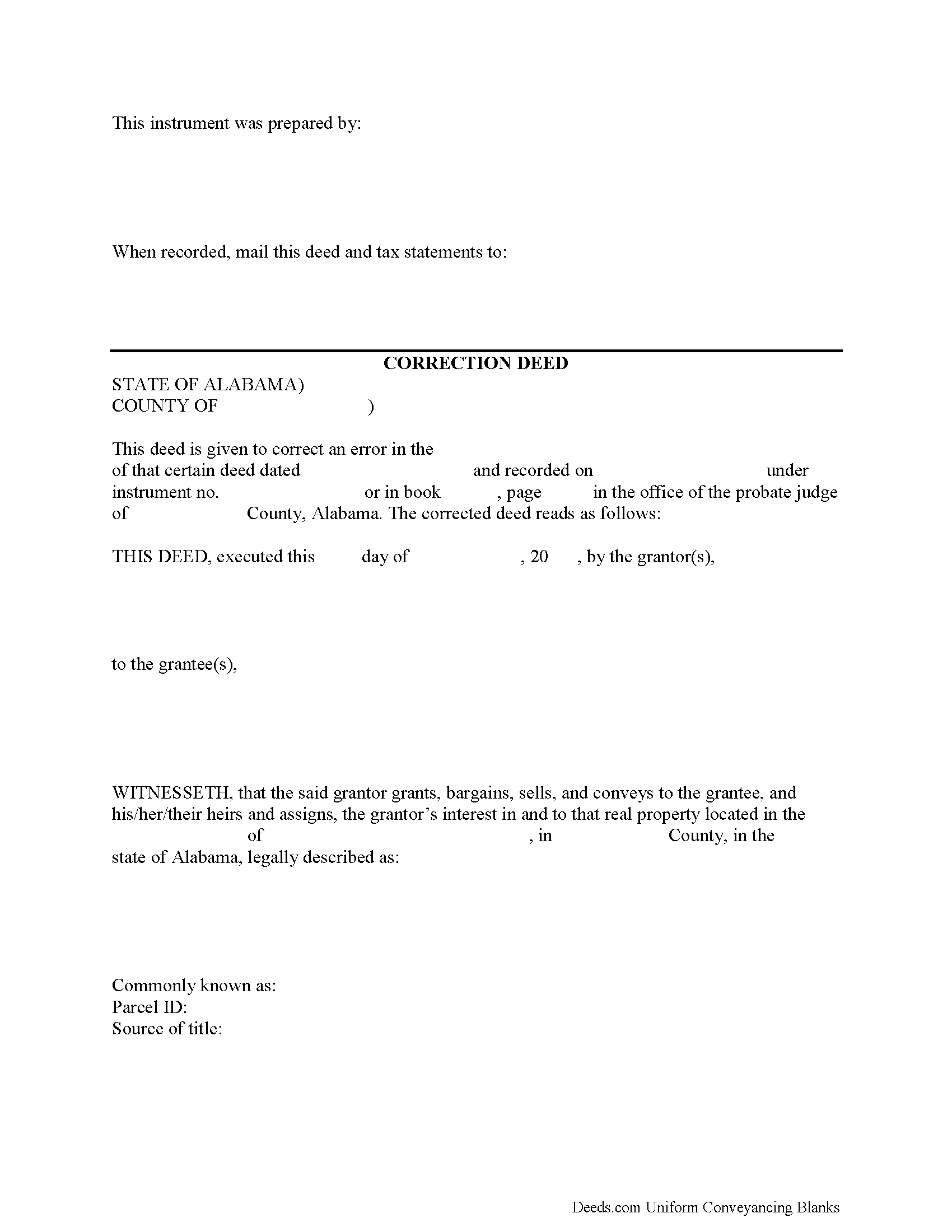
A correction deed is an instrument used to correct an error in a deed that has been recorded at an earlier date. This type of deed is important because it ensures the accuracy of property records, which are essential for clear property titles and smooth real estate transactions.
In order to correct a prior deed on record, use a correction deed, which must be notarized and recorded at the same county agency as the earlier deed. The correction deed makes specific reference, by execution and recording date, as well as instrument ID or book/page number, to the earlier deed and rerecords it in its entirety. It states the type of error made and adds the corrected information in the respective section of the instrument. All parties who signed the prior deed must sign the correction deed in the presence of a notary.
Common reasons to use a Correction Deed.
Correcting Minor Errors: A Correction Deed is often used to rectify minor mistakes in a previously recorded deed, such as typographical errors, misspellings, or errors in personal details of the grantor or grantee (like names or addresses).
Property Description: One of the most common reasons for using a Correction Deed is to... More Information about the Alabama Correction Deed
Correction Quitclaim Deed
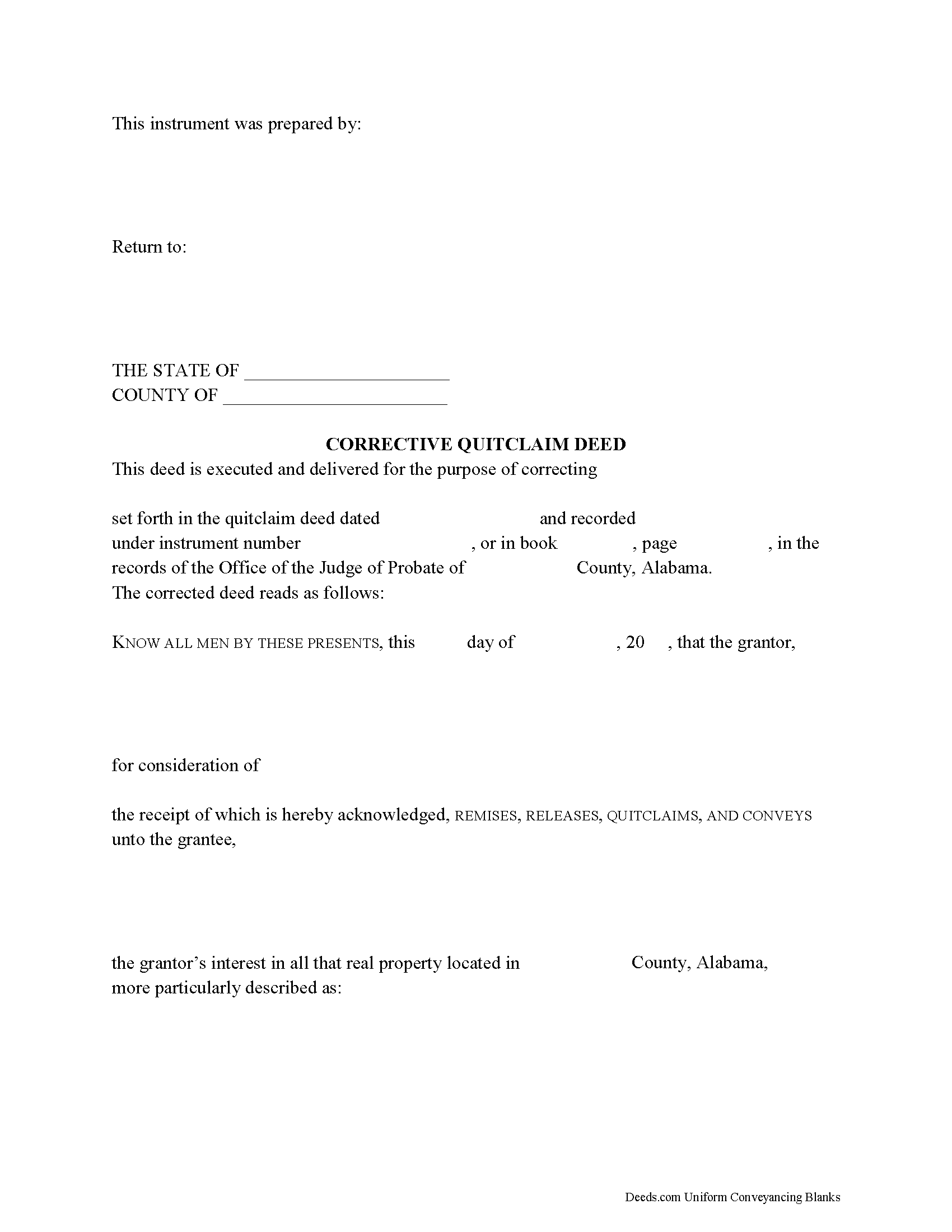
Corrective Quitclaim Deeds in Alabama
What happens when there is an error in your deed? What can you do to fix it? One option may be filing a corrective deed.
A corrective deed is an instrument used to correct a small error in a deed that has been recorded at an earlier date. Note that corrective deeds cannot change the nature of the transfer, so make sure to use the same type of document. For example, to correct a recorded quitclaim deed, use a corrective quitclaim deed.
Corrections can only be made to non-material errors, causing no actual change in the substance, or facts, of the deed. Common minor errors include misspelled names or missing information, such as marital status, or a mistake transcribing courses and distances in the legal description of the property. Material changes to the substance of the deed have a legal effect in how property is titled, and therefore require a new deed.
On the corrective deed, give the recording information from the previously filed document, then identify which section contains the error. Provide the correct details in the body of the deed. The corrective deed states the nature of the error and recites the date and recording inf... More Information about the Alabama Correction Quitclaim Deed
Correction Warranty Deed
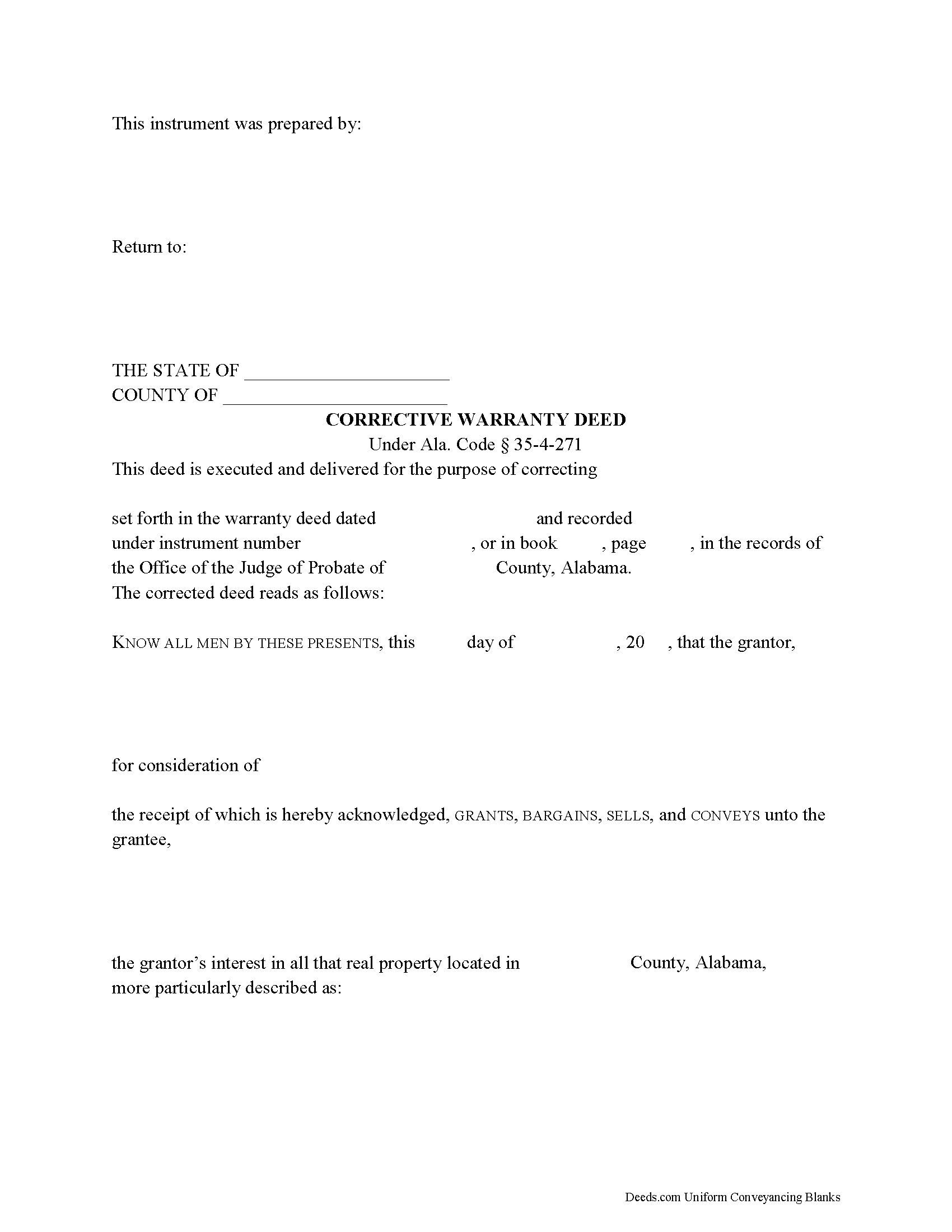
Corrective Warranty Deeds in Alabama
You just bought a new house, have your deed in hand, and you are ready to relax in your new home. But after taking another look at the deed, you notice a mistake in the legal description. Now what?
Alabama law provides for reformation of a deed by judicial intervention under (Ala. Code 1975, 35-4-150), but filing a corrective deed might be an option to resolve simple mistakes.
A corrective deed is an instrument used to fix an error in a deed that was recorded at an earlier date. It can only be used to correct non-material errors, causing no actual change in the substance of the deed. Common minor errors include misspelled names or missing information, such as marital status, or a mistake transcribing courses and distances in the legal description of the property. Major changes to the substance of the deed, or details that effect how property is titled require a new deed.
A corrective warranty deed has the same form as the previously recorded warranty deed containing the error and includes all the same information, in addition to correcting the error. The corrective deed states the nature of the error and recites the date and recordi... More Information about the Alabama Correction Warranty Deed
Durable Power of Attorney
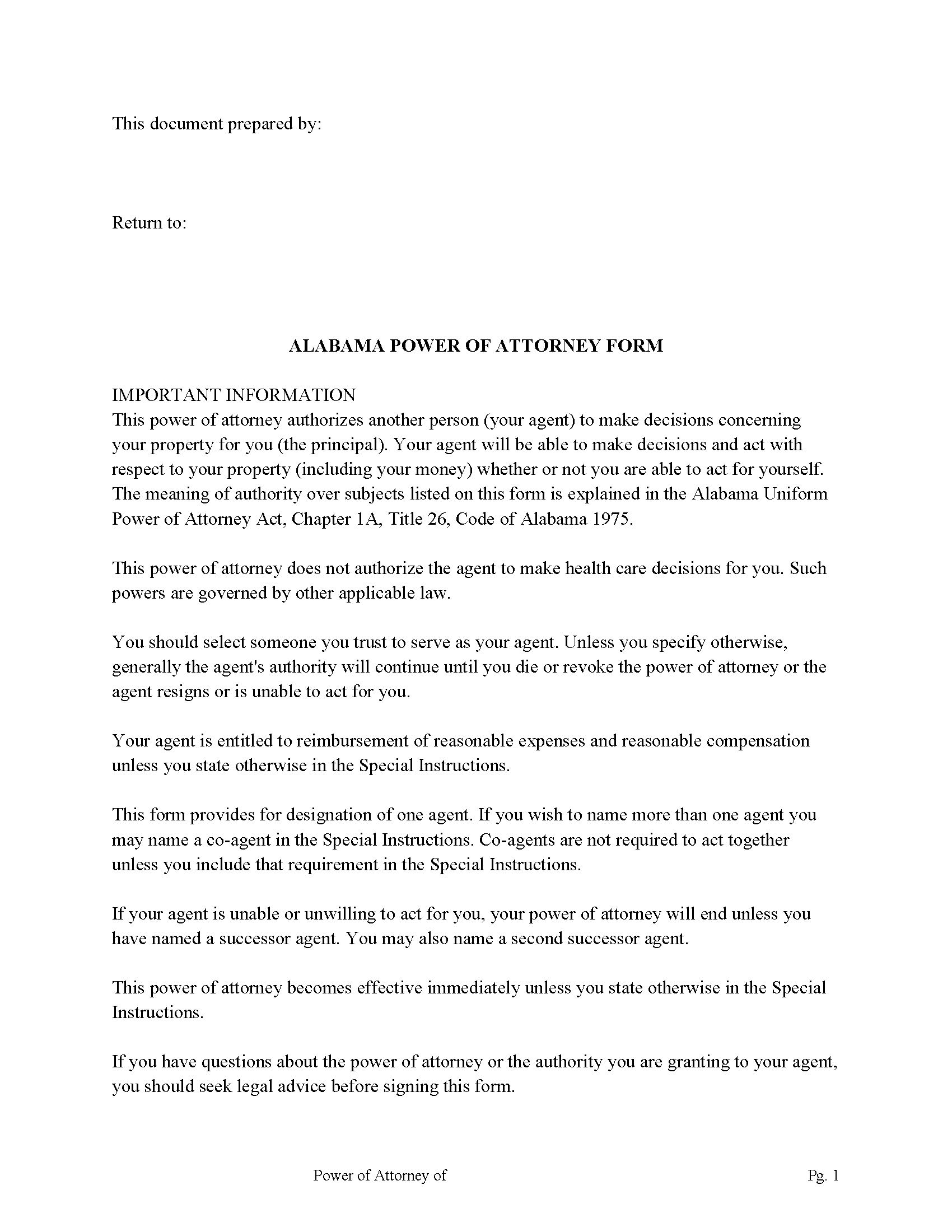
This is a general statutory power of attorney guided by the Alabama Uniform Power of Attorney Act, Chapter 1A, Title 26, that becomes (effective when executed unless the principal provides in the power of attorney that it becomes effective at a future date or upon the occurrence of a future event or contingency.) (26-1A-109)
Unless otherwise stated this power of attorney is Durable meaning (not terminated by the principal's incapacity.) (26-1A-102(2))
(A principal may designate one or more successor agents to act if an agent resigns, dies, becomes incapacitated, is not qualified to serve, or declines to serve. A principal may grant authority to designate one or more successor agents to an agent or other person designated by name, office, or function. Unless the power of attorney otherwise provides, a successor agent: (1) has the same authority as that granted to the original agent; and (2) may not act until all predecessor agents have resigned, died, become incapacitated, are no longer qualified to serve, or have declined to serve.) (26-1A-111(b)
Eve... More Information about the Alabama Durable Power of Attorney
Limited Power of Attorney for the Sale of Real Property
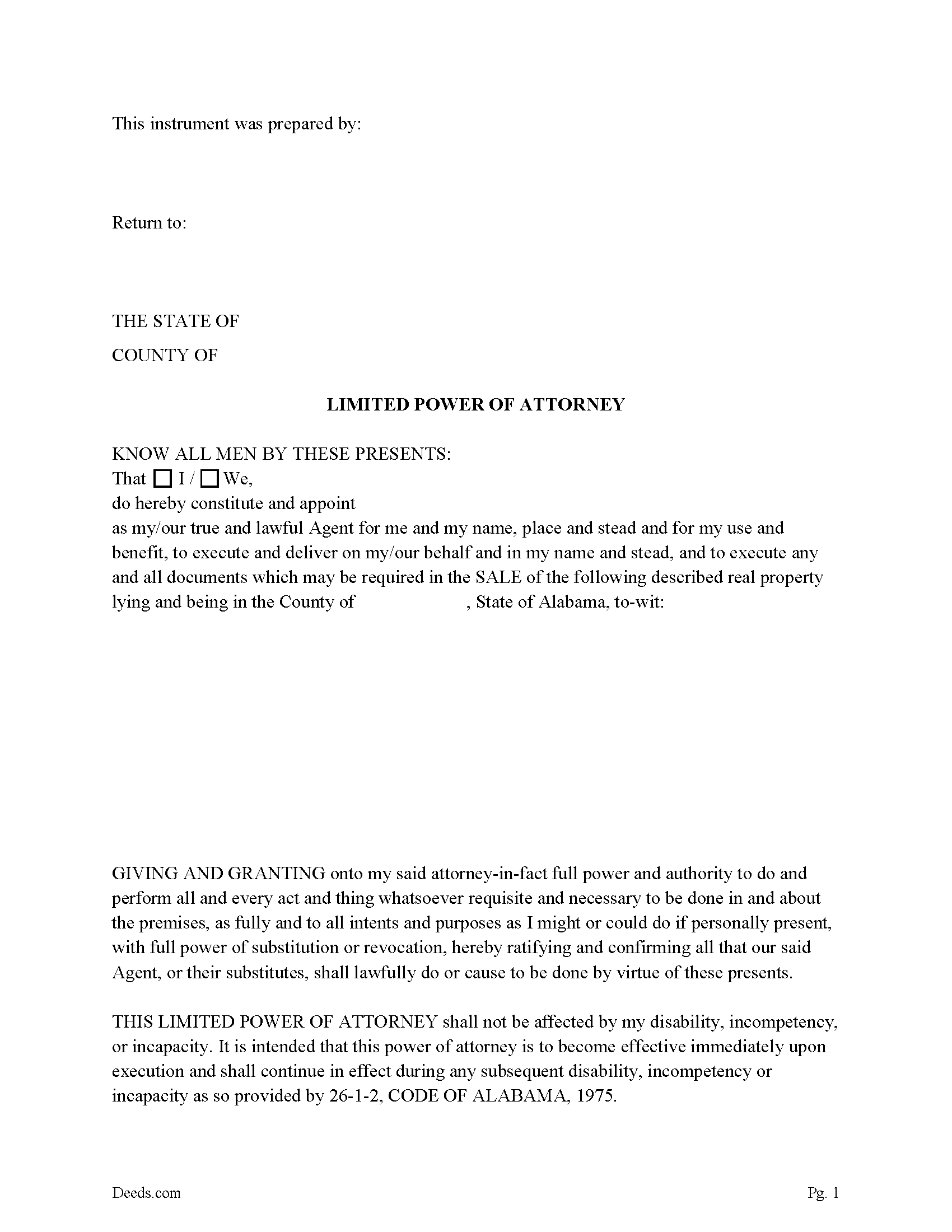
This form is used for the sale of real property located in Alabama. The principal designates an agent and empowers him/her to act in all necessary legal documents for the sale of a specific property. The Limited Power of Attorney is durable and shall not be affected by the principal's disability, incompetency, or incapacity and terminates immediately upon the satisfactory closing of the specified property.
Recording: For the POA to be used in a real estate transaction, it usually must be recorded in the county where the property is located. This is necessary for deeds and other documents executed by the agent to be recorded and considered valid.
Agent's Duties: The agent is expected to act in the principal's best interest, maintain accurate records, keep the principal's property separate from theirs, and avoid conflicts of interest.
... More Information about the Alabama Limited Power of Attorney for the Sale of Real Property
Limited Power of Attorney for the Purchase of Real Property
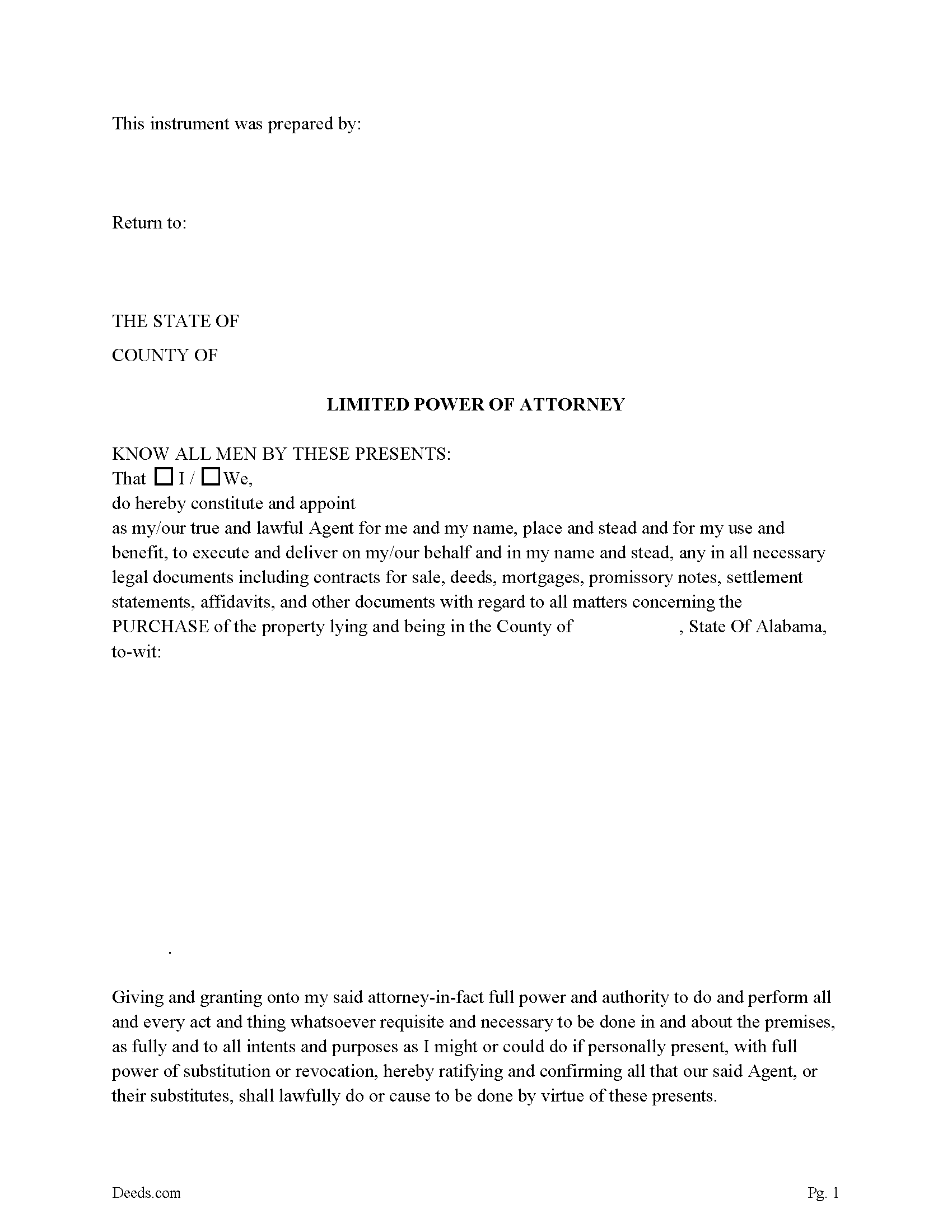
This form is used for the purchase of real property. The principle designates an agent and empowers him/her to act in all necessary legal documents including contracts for sale, deeds, mortgages, promissory notes, settlement statements, affidavits, and other documents with regard to all matters concerning the PURCHASE of the property. The Limited Power of Attorney is durable and shall not be affected by the principle's disability, incompetency, or incapacity although an expiration date is set by the principle as to the number of days the power of attorney stays active after its execution.
Recording: For the POA to be used in a real estate transaction, it usually must be recorded in the county where the property is located. This is necessary for deeds and other documents executed by the agent to be recorded and considered valid.
Agent's Duties: The agent is expected to act in the principal's best interest, maintain accurate records, keep the principal's property separate from theirs, and avoid conflicts of interest.
For use in Alabama only.... More Information about the Alabama Limited Power of Attorney for the Purchase of Real Property
Memorandum and Notice of Agreement
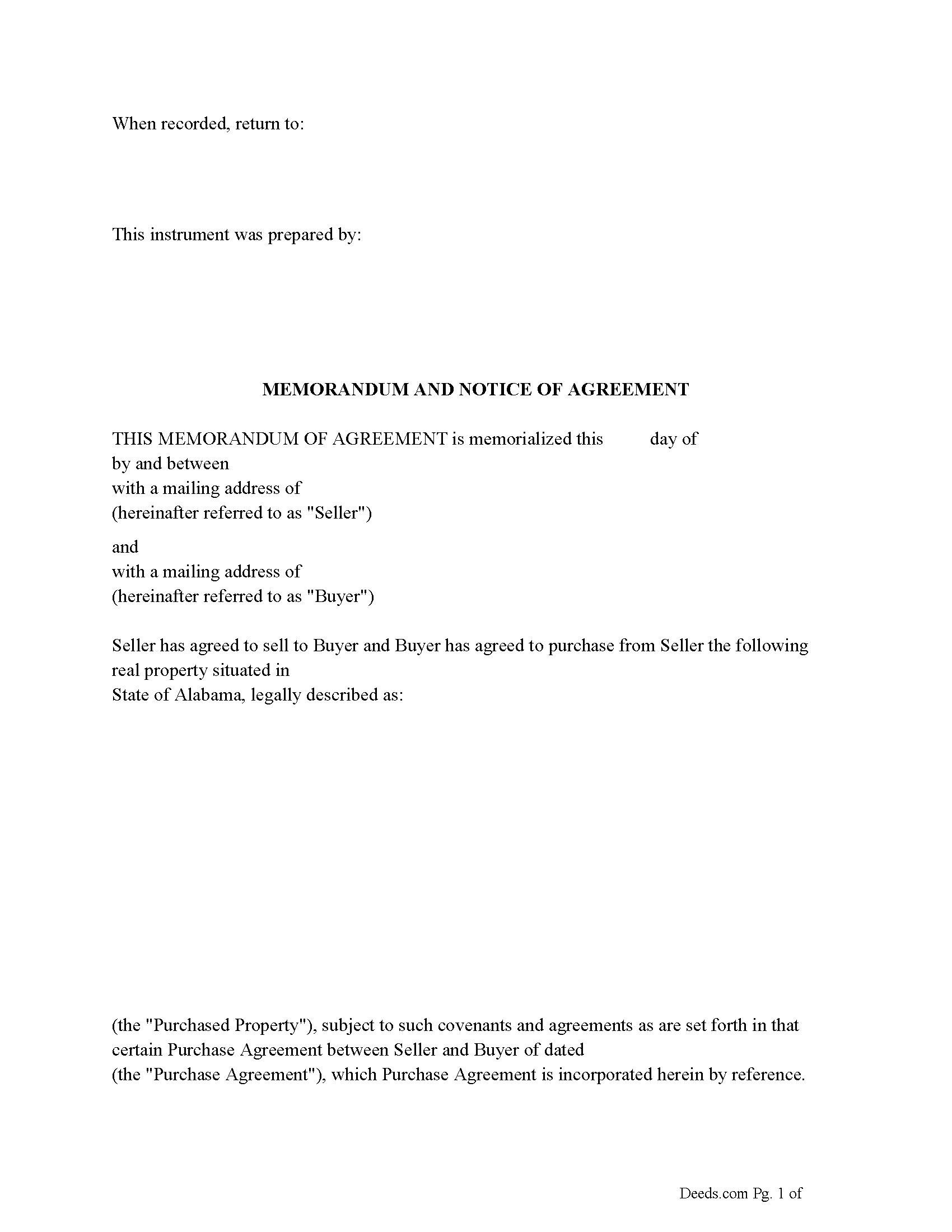
A "Memorandum of Purchase Agreement" commonly referred to as a "Memorandum of Agreement" (MOA) or "Memorandum of Understanding" (MOU) in the context of real estate, is used primarily as a means to provide public notice of an equitable interest in a real estate transaction without disclosing the full details of the purchase agreement. This document is particularly useful in transactions where the buyer and seller have agreed to terms but the final closing and transfer of the deed have not yet occurred. By recording this memorandum with the county recorder's office, the buyer establishes a public record of their interest in the property, which can protect against subsequent claims or liens by third parties.
Key Purposes of a Memorandum of Purchase Agreement:
1. Notice of Equitable Interest: The memorandum serves as notice to the public that the buyer has an equitable interest in the property due to the purchase agreement. This is important in protecting the buyer’s interest against claims by other parties who might otherwise be unaware of the agreement.
2. Protection During the Closing Process: Real estate transactions can involve a lengthy closing process, including financ... More Information about the Alabama Memorandum and Notice of Agreement
Easement Deed
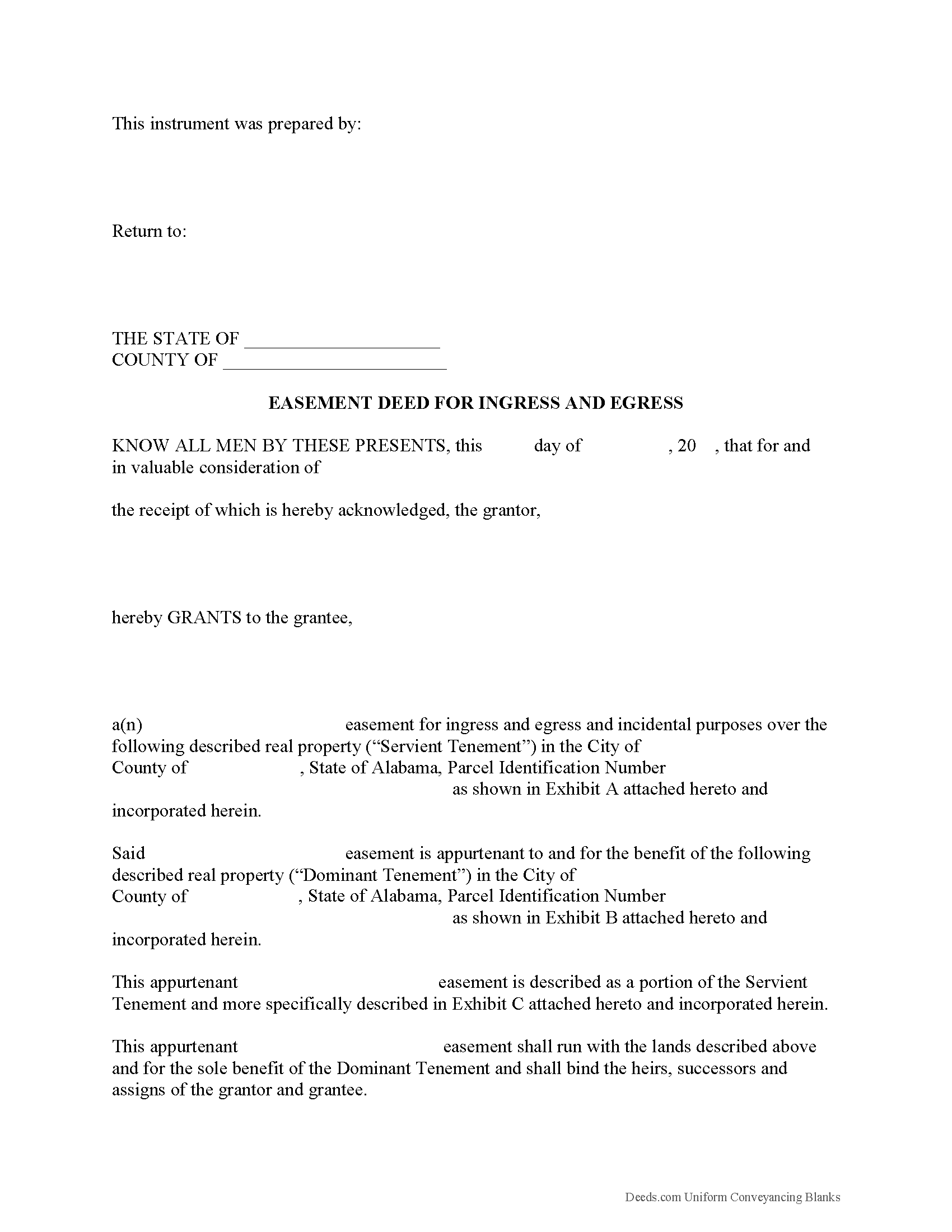
Easements in Alabama
An easement is a non-possessory right in the holder of an easement to use land. In other words, an easement is a "lesser" interest in the real estate that allows the party benefiting from the easement use the property, such as using it for access, installation of utility lines, etc. [1]
There are three major types of easements; appurtenant easements, easements in gross, and prescriptive easements. The transferability of an easement depends on what type it is. Two parties must be present to create an easement: the grantor, or the servient tenant, is the person who owns the property, and the grantee, or dominant tenant, is the person who is allowed access to the property. Easements can either be exclusive, meaning the servient tenant is excluded from the benefits of the easement, or non-exclusive, where the servient tenant can access these benefits.
Easements can also create restrictions on property use, like prohibiting where someone might build a fence or add a structure to their property. In Alabama, easements do not have to be acquired by express conveyance; they can also be implied or acquired through necessity, as opposed to a formal recorded inst... More Information about the Alabama Easement Deed
Termination, Cancellation of Easement / Right of Way
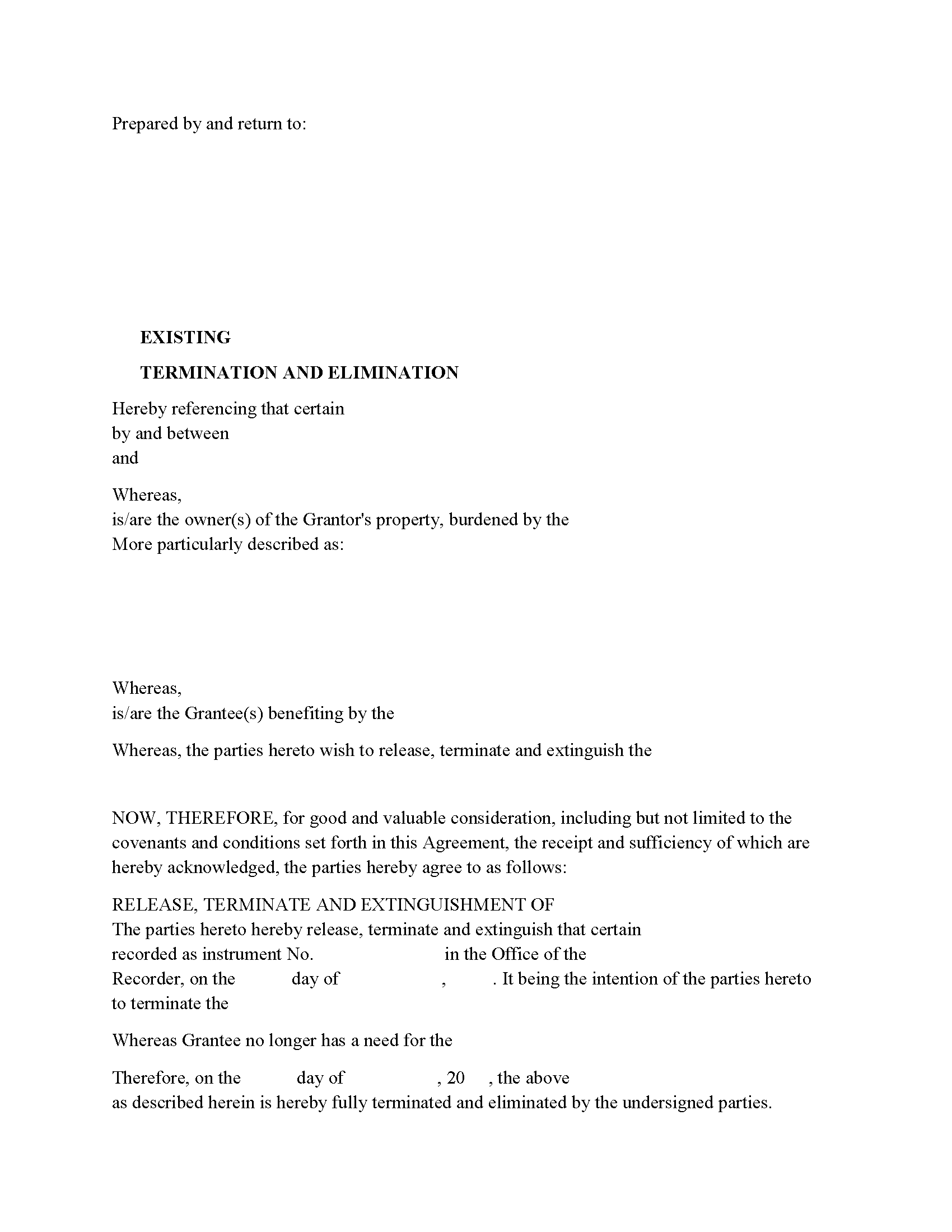
Use this form to release, terminate, extinguish a previously recorded document that involves access to and from a property.
Documents such as:
1. Easement Deeds or Agreements (An easement is a non-possessory interest in land, granting the right to use someone else's property for a specific purpose, like a driveway or utility line)
2. Access Roads
3. Right of Ways
4. Utility Easements (Power, Gas, Water, Sewer, Etc.)
5. Drainage Easements
This document allows the owner of the land, burdened by the access and the party that benefits from the access, to sign an agreement releasing the property from such access, ... More Information about the Alabama Termination, Cancellation of Easement / Right of Way
Mineral Deed
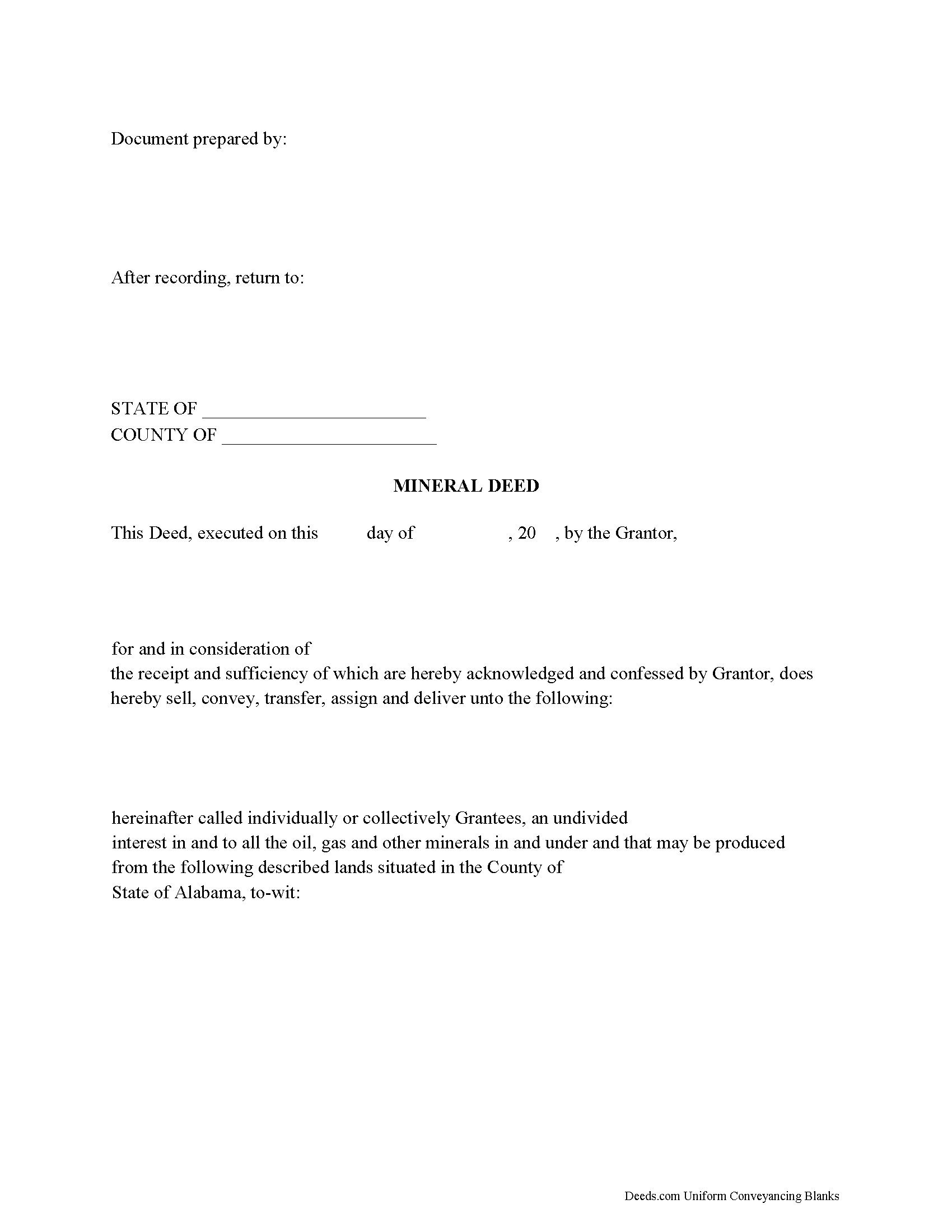
The General Mineral Deed in Alabama transfers oil, gas, and mineral rights from the grantor to the grantee. THIS IS NOT A LEASE. There are no Exceptions or Reservations included.
The transfer includes the oil, gas and other minerals of every kind and nature. It also transfers any and all rights to receive royalties, overriding royalties, net profits interests or other payments out of or with respect to those oil, gas and other minerals. The Grantor can stipulate the percentage of Mineral Rights the Grantee will receive and is made subject to any rights existing under any valid and subsisting oil and gas lease or leases of record.
This general mineral deed gives the grantee the right to access, for the purpose of mining, drilling, exploring, operating and developing said lands for oil, gas, and other minerals, and storing handling, transporting and marketing of such.
In this document the Grantor Warrants and will defend said Title to Grantee. Use of this document has a permanent effect on your rights to the property, if you are not completely sure of what you are executing seek the advice of a legal professional.... More Information about the Alabama Mineral Deed
Mineral Deed with Quitclaim Covenants
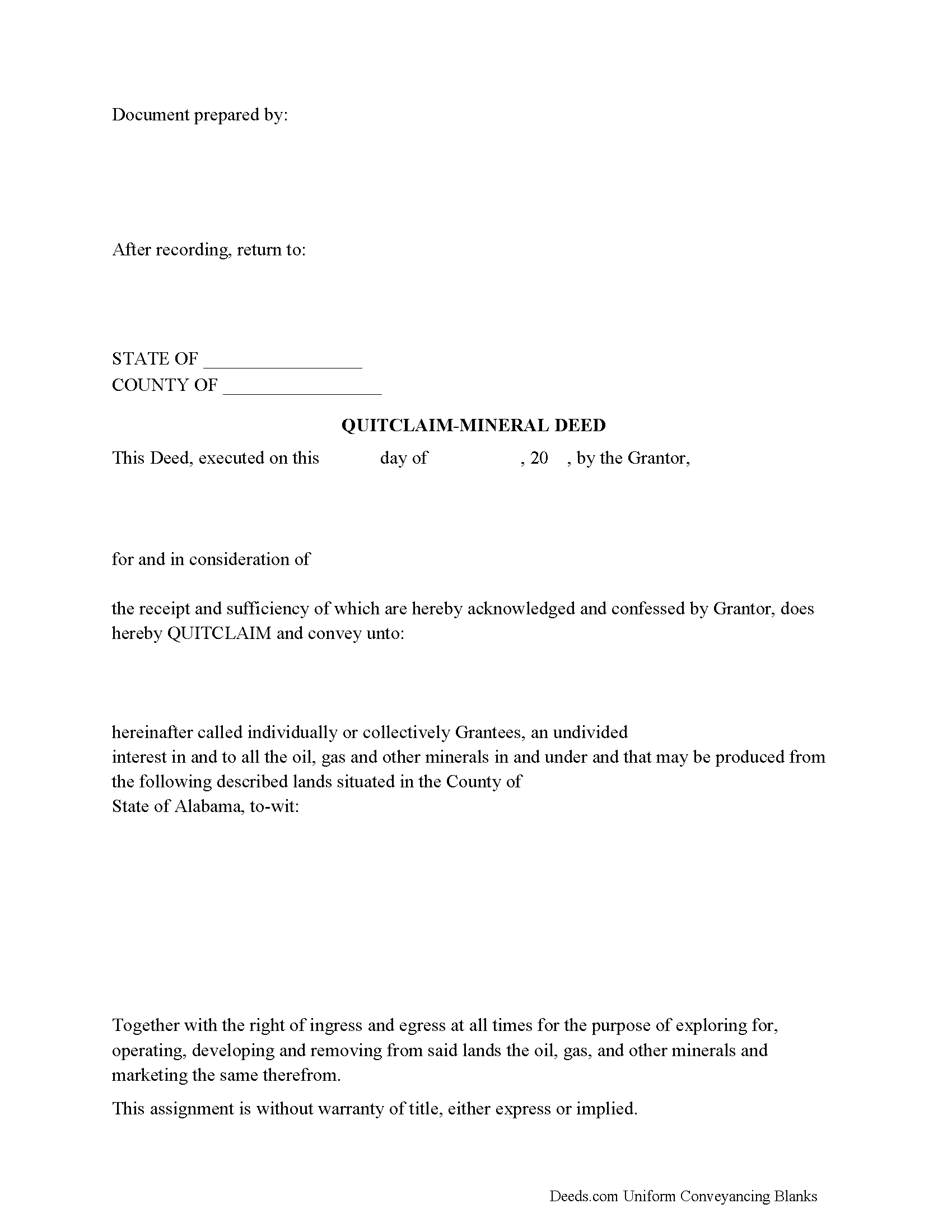
The General Mineral Deed in Alabama Quitclaims oil, gas, and mineral rights from the grantor to the grantee. THIS IS NOT A LEASE. There are no Exceptions or Reservations included.
The transfer includes the oil, gas and other minerals of every kind and nature. The Grantor can stipulate the percentage of Mineral Rights the Grantee will receive.
This general mineral deed gives the grantee the right to access, for the purpose of mining, drilling, exploring, operating and developing said lands for oil, gas, and other minerals, and storing handling, transporting and marketing of such.
The seller, or grantor Quitclaims the mineral rights and does NOT accept responsibility to any discrepancy of title (This assignment is without warranty of title, either express or implied)
Uses: Mineral deeds with quitclaim are often used in situations where the grantor wants to quickly release any interest they might have in mineral rights, such as in settling estates, resolving disputes, clearing up uncertainties about ownership in a title's history or when mineral rights have previously been severed or fragmented from surface rights and cloud a title, making it difficult to transfer property... More Information about the Alabama Mineral Deed with Quitclaim Covenants
Notice of Intention to File Mechanic Lien
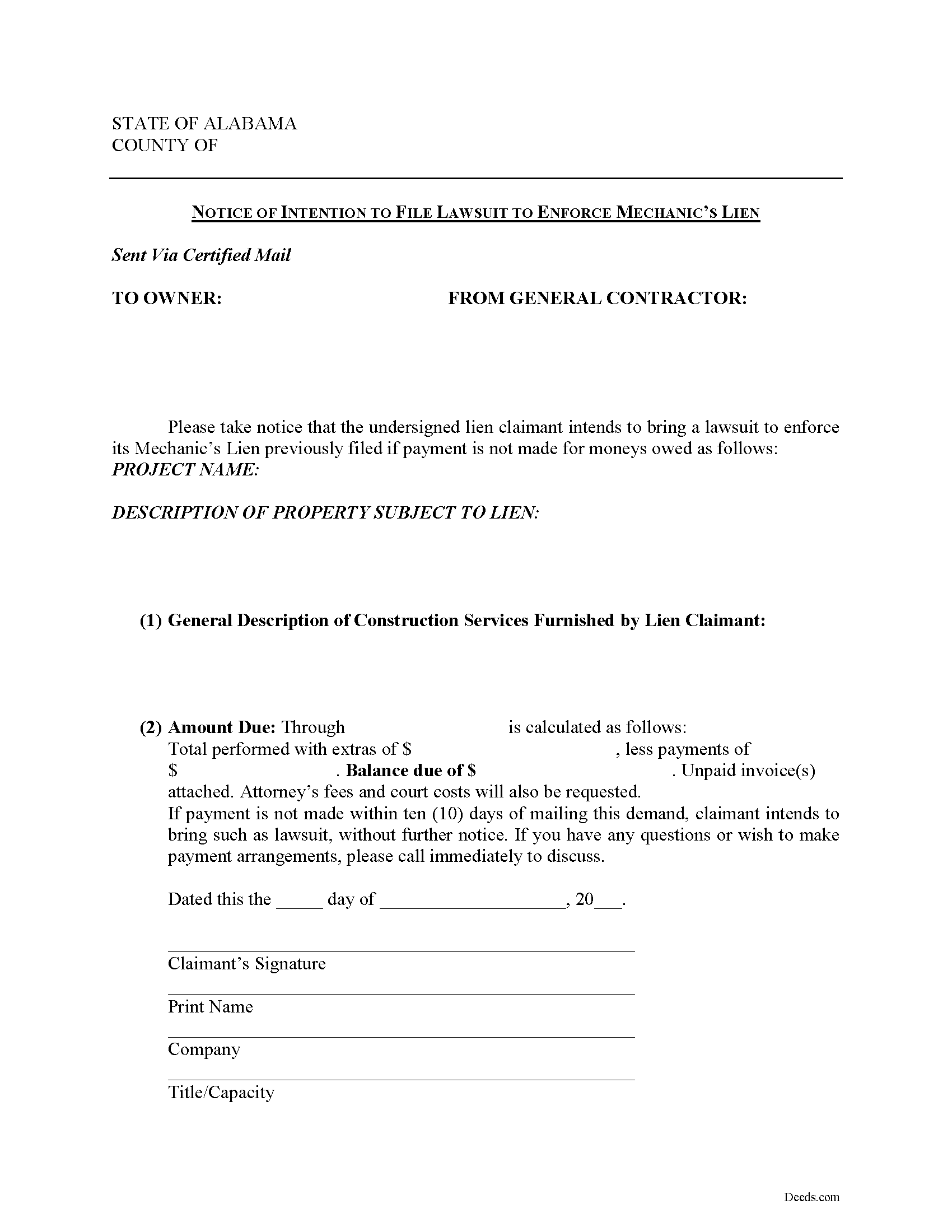
Steps Before Filing a Lawsuit to Enforce an Alabama Mechanic's Lien
Lawsuits can be long, emotionally draining, and expensive. Therefore, before filing suit, first attempt an informal settlement with the other party. When dealing with mechanic's liens in Alabama, a good technique is to send the owner notice of intention to sue to enforce the lien if timely payment is not made first.
When the amount involved exceeds $50.00, actions for the enforcement of liens may be brought in the circuit court having jurisdiction in the county in which the property is situated. Ala. Code Ann. 35-11-220. In all other cases actions to enforce such liens shall be brought before the district court in the county in which the property is situated. Id.
Any action for the enforcement of the lien declared in this division must be commenced within six months after the maturity of the entire indebtedness secured thereby. Ala. Code Ann. 35-11-221. Therefore, ensure the notice is sent within this timeline to prevent inadvertently waiving the right to claim a lien.
The notice identifies the parties, the location of the project, the nature of materials and services provided for the project, and relev... More Information about the Alabama Notice of Intention to File Mechanic Lien
Full Price Lien Notice
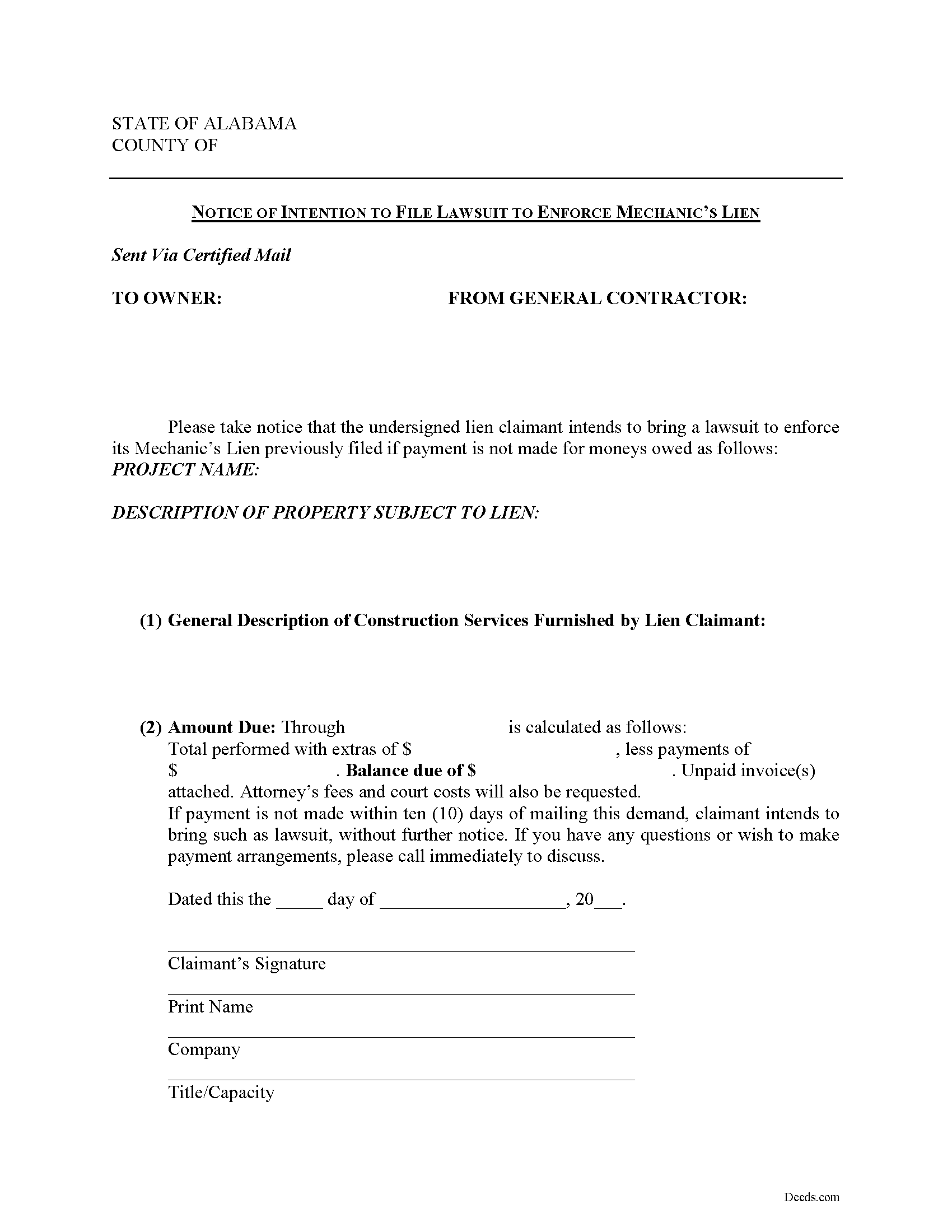
In Alabama, a full price lien is sought to secure the full price specified for any materials furnished on a construction job. To claim a full price lien, the full price lien notice must be provided to the property owner of record before materials are furnished on the job. Full price liens are available to prime contractors who have contracted directly with the property owner.
Under Ala. Code Ann. 35-11-210, before furnishing any material for use in the project, prime contractors must notify the owner or his or her agent in writing, of certain specified prices. Unless the owner formally objects, this preliminary notice reserves the prime contractor's right to a lien for the full price as specified in the notice, without regard to whether or not the amount of the claim for the material so furnished exceeds the unpaid balance due the contractor. If the owner objects to the prices, he must notify the prime contractor in writing before the material is used, that he or she will not be responsible for the price thereof. This allows both the contractor and the owner to understand the terms of the contract, and gives them an opportunity to discuss contentious points before the work begin... More Information about the Alabama Full Price Lien Notice
Notice of Unpaid Balance Lien
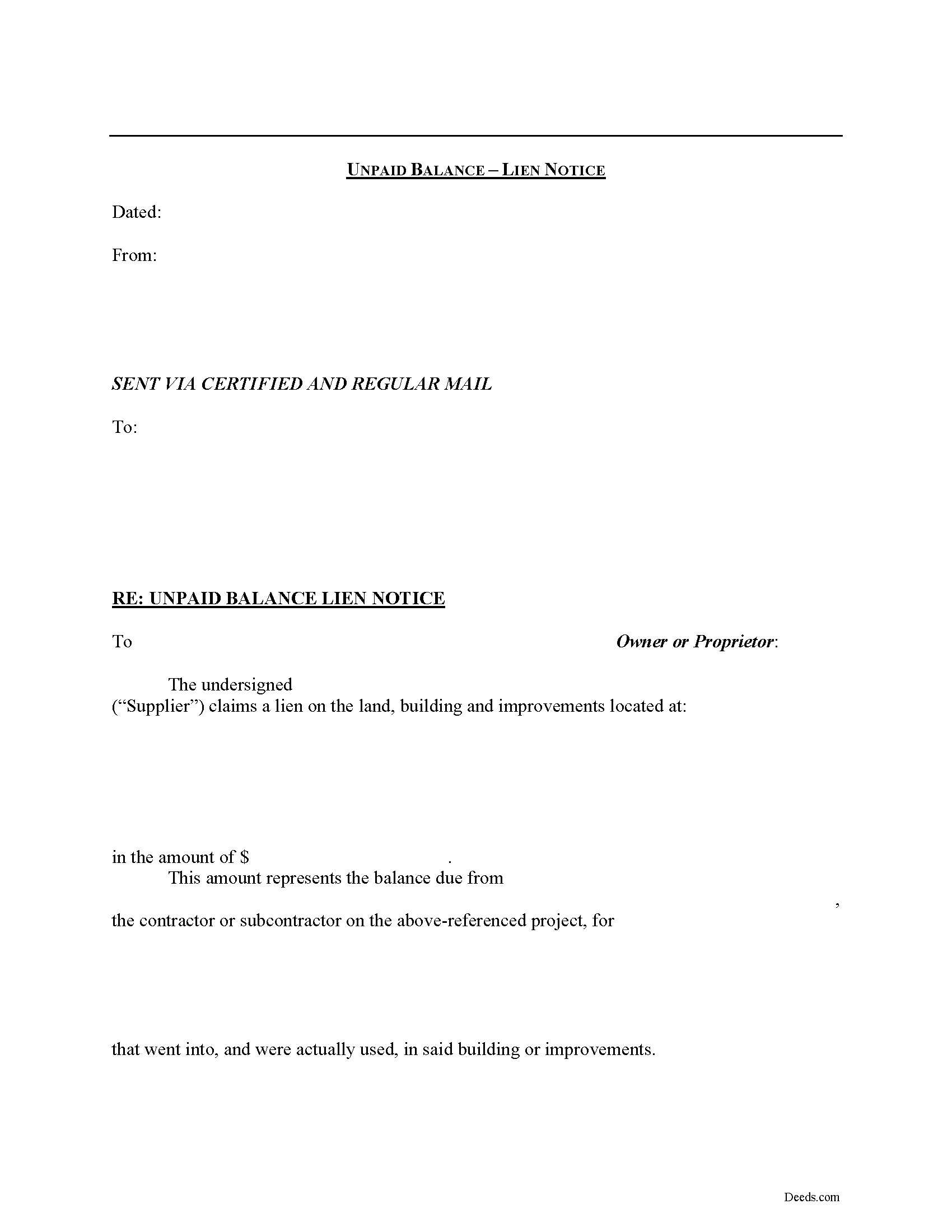
Declaring an Unpaid Balance Lien in Alabama
Unpaid balance liens are used by material suppliers on a construction job. The term "material suppliers" refers to those parties who furnish materials incorporated in the building or improvement on the subject property.
Employees of the contractor or persons furnishing material to him or her, shall have a lien that extends only to the amount of any unpaid balance due to the contractor by the owner or proprietor, and the employees and materialmen shall also have a lien on the unpaid balance. See Ala. Code Ann. 35-11-210.
The unpaid balance lien notice contains the names of the lien claimant and property owner, as well as a description of the owner's property and of the materials furnished, and the claimed price amount. The notice should be sent to the owner of the property and any other interested party by both regular and certified mail to ensure delivery.
This article is provided for informational purposes only and should not be relied upon as a substitute for the advice from a licensed attorney. Please contact an Alabama attorney for any questions regarding mechanic's liens.... More Information about the Alabama Notice of Unpaid Balance Lien
Verified Statement of Mechanics Lien
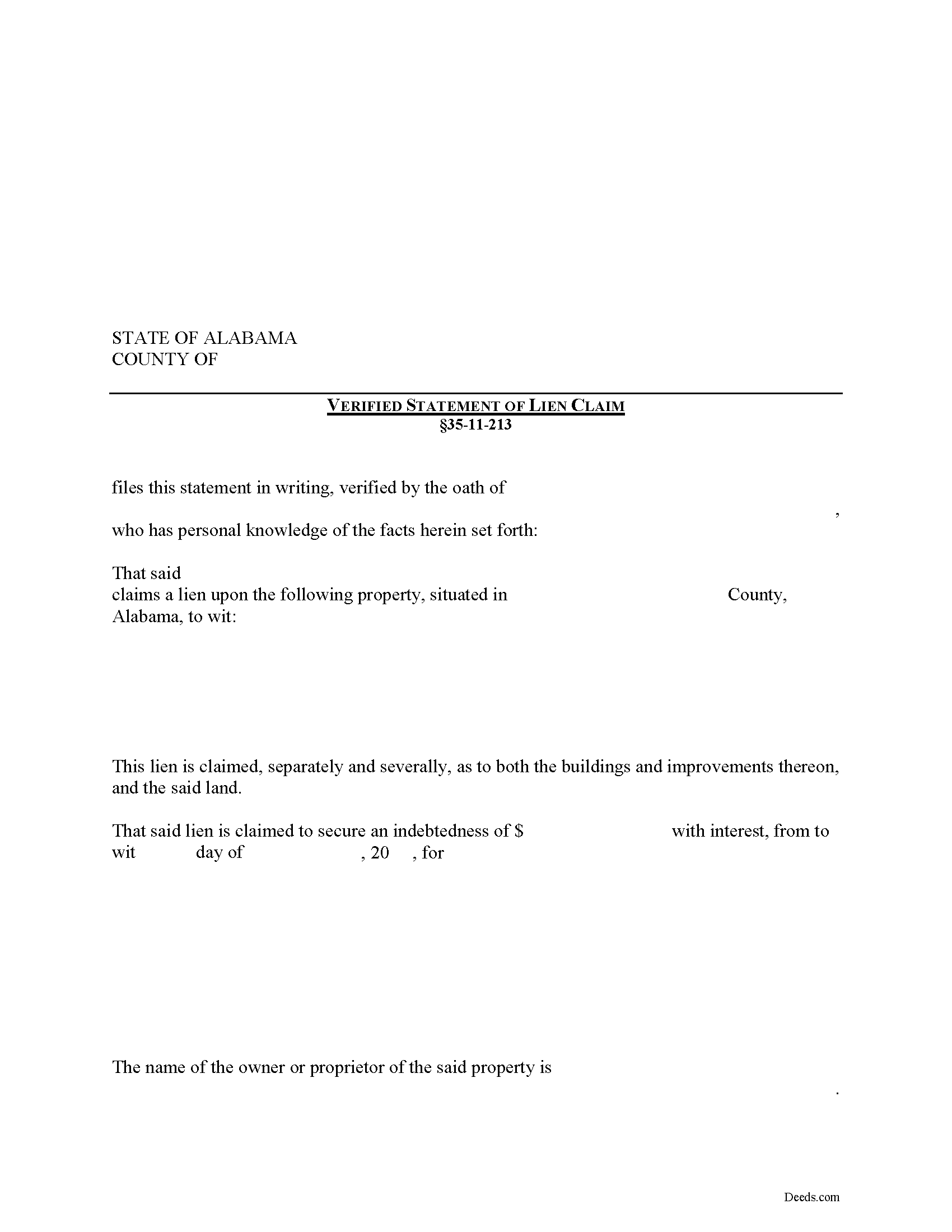
Filing a Mechanic's Lien in Alabama
Obtaining a lien for construction work, including the furnishing of labor or materials, must be accomplished by filing a verified statement with the probate court in the Alabama county where the subject property is located.
Every person entitled to a lien must file, in the office of the judge of probate of the county in which the property upon which the lien is sought is situated, a statement in writing, verified by the oath of the person claiming the lien, or of some other person having knowledge of the facts, containing 1) the amount of the demand secured by the lien, after all just credits have been given, 2) a description of the property on which the lien is claimed in such a manner that same may be located or identified, a description by house number, name of street, and name of city or town being a sufficient description where the property is located in a city or town, and 3) the name of the owner or proprietor thereof; but no error in the amount of the demand or in the name of the owner or proprietor, shall affect the lien. Ala. Code Ann. 35-11-213. Unless such statement is so filed the lien shall be lost. Id.
To preserve lien rig... More Information about the Alabama Verified Statement of Mechanics Lien
Declaration of Lien Rights
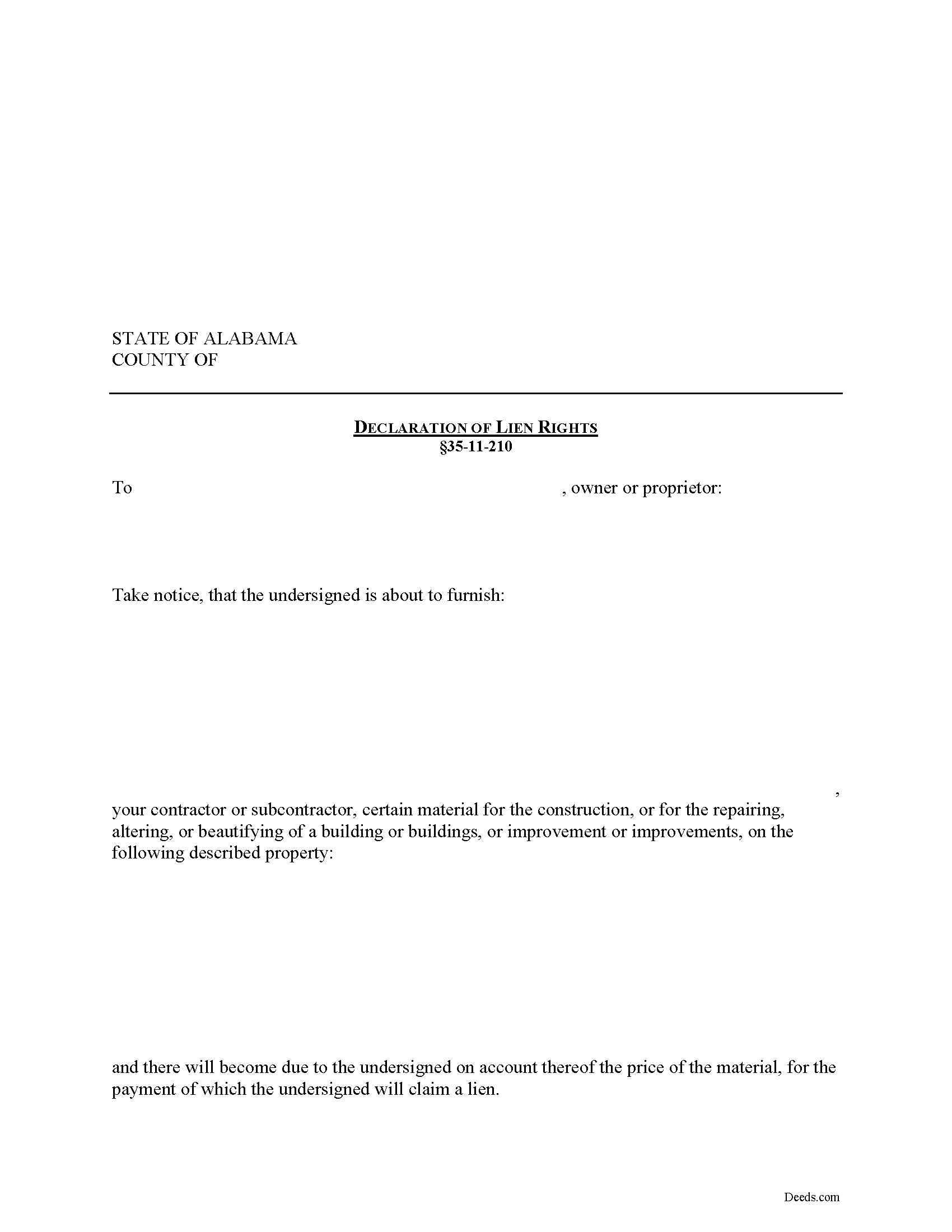
Establishing Lien Rights without a Direct Contract in Alabama
In Alabama, laborers, material suppliers, or any other person or firm that furnished work, labor, or material on a piece of property has a valid claim for a lien. Liens of this type are called mechanic's or construction liens. In Alabama, a claimant can claim either a full price or an unpaid balance lien. A full price lien is available to contractors that have contracted directly with the owner for the full price of labor, services, or materials. An unpaid balance lien is available for laborers, subcontractors, or materials suppliers without a direct contract and a lien is limited only to the unpaid balance.
Upon complying with the provisions of Alabama lien law, lien claimants shall have a lien on the building or improvements as well as on the land on which these are situated. Ala. Code Ann. 35-11-210. The lien exists to the extent in ownership of all the right, title, and interest therein of the owner or proprietor, and to the extent in area of the entire lot or parcel of land in a city or town; or, if not in a city or town, of one acre in addition to the land upon which the building or improvement is situated. I... More Information about the Alabama Declaration of Lien Rights
Acknowledgment of Satisfaction
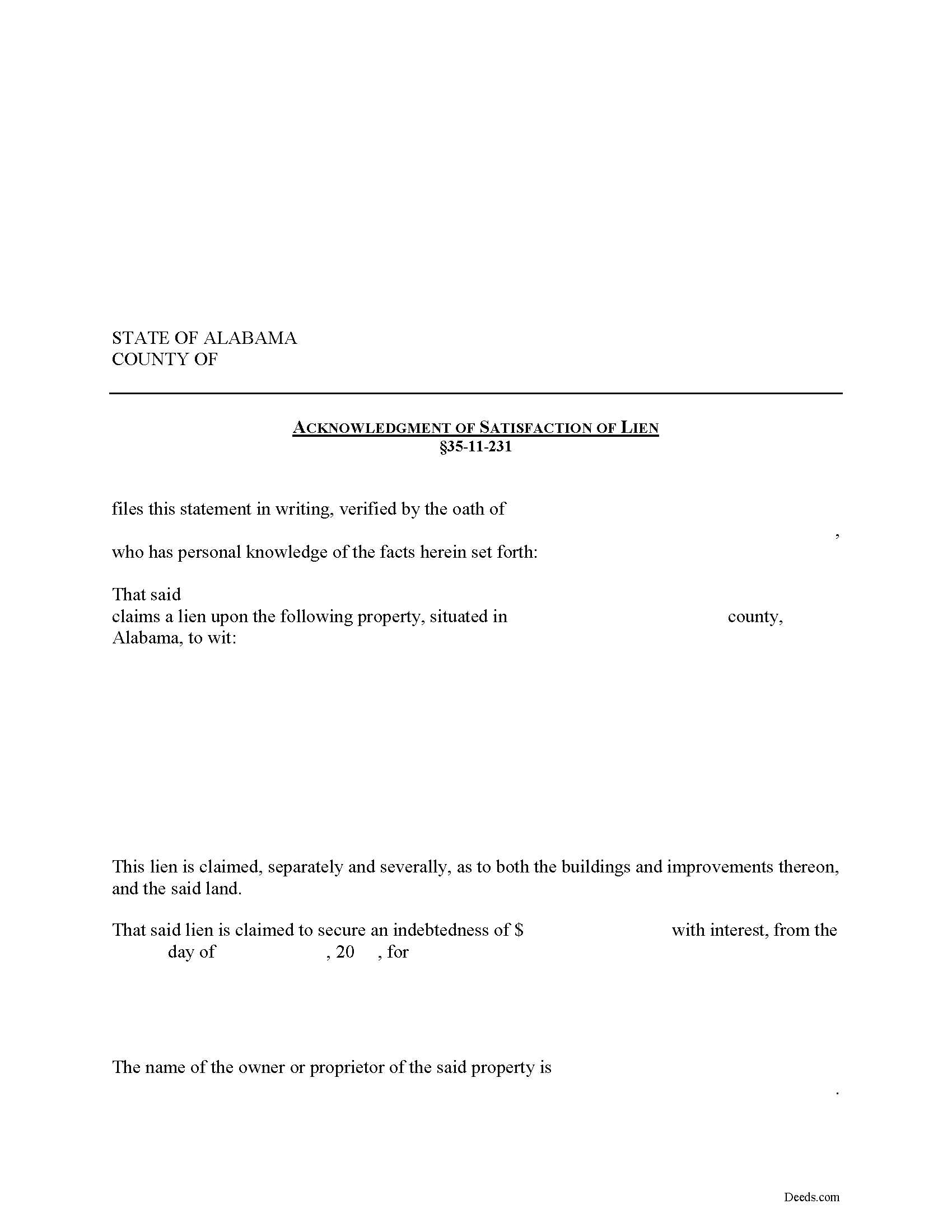
Releasing a Lien with an Alabama Acknowledgment of Satisfaction
When a previously filed lien has been paid off in full or must be released for any other reason, the lien claimant needs to file a document called an "Acknowledgment of Satisfaction. Whenever any such lien has been fully satisfied, the holder thereof must acknowledge satisfaction of the same on the margin of the record in the office of the judge of probate. Ala. Code Ann. 35-11-231(a).
Under the state's lien code, a lien holder is required to file this form or can face penalty for failure to timely file upon the owner's demand. Any holder of such lien, who, after having been fully paid fails for thirty (30) days after demand in writing to so acknowledge satisfaction thereof, shall be liable to any person thereby injured to the amount of such injury, which shall not be less than $200.00. Ala. Code Ann. 35-11-231(b).
An acknowledgment of satisfaction identifies the parties, the property where the improvement or work took place, relevant dates and expenses, and a description of the completed work. File the completed document in the records for the county where the property is situated.
This article is provided... More Information about the Alabama Acknowledgment of Satisfaction
Conditional Lien Waiver on Progress Payment
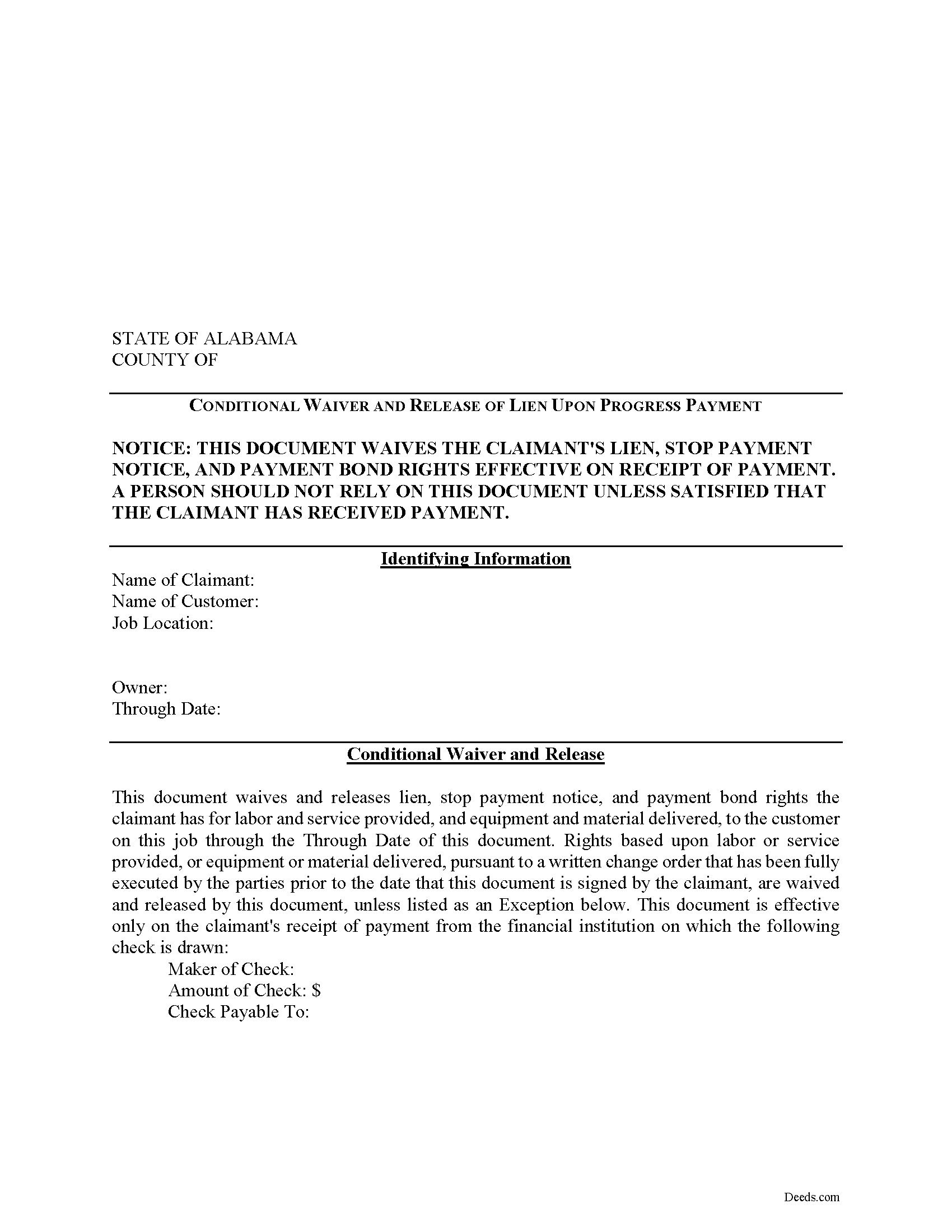
Conditional Waiver and Release of Lien on Progress Payment
Alabama mechanic's liens are governed under Chapter 11 of the Alabama Property Code (Section 11). Throughout the construction process, potential claimants may elect to serve the property owner with a lien waiver in exchange for partial or full payment.
The term "waiver" refers to giving up a legal right. In this case, the person granting the waiver is giving up the right to seek a mechanic's lien for all or part of the amount due. This assurance is usually enough to get the other party to pay. In Alabama, there are no statutory forms for waivers although according to the principles of contract law, the parties may agree to such modifications in writing.
Waivers generally come in four varieties: conditional or unconditional, and partial or final. A conditional waiver means the waiver is conditioned upon the claimant receiving the amount due, while unconditional waivers are effective regardless if payment is actually made. Partial waivers are used to waive a lien for up to the partial or progress payment amount, and final waivers release all lien rights based on a customer's full payment.
Partial waivers are use... More Information about the Alabama Conditional Lien Waiver on Progress Payment
Unconditional Lien Waiver on Progress Payment
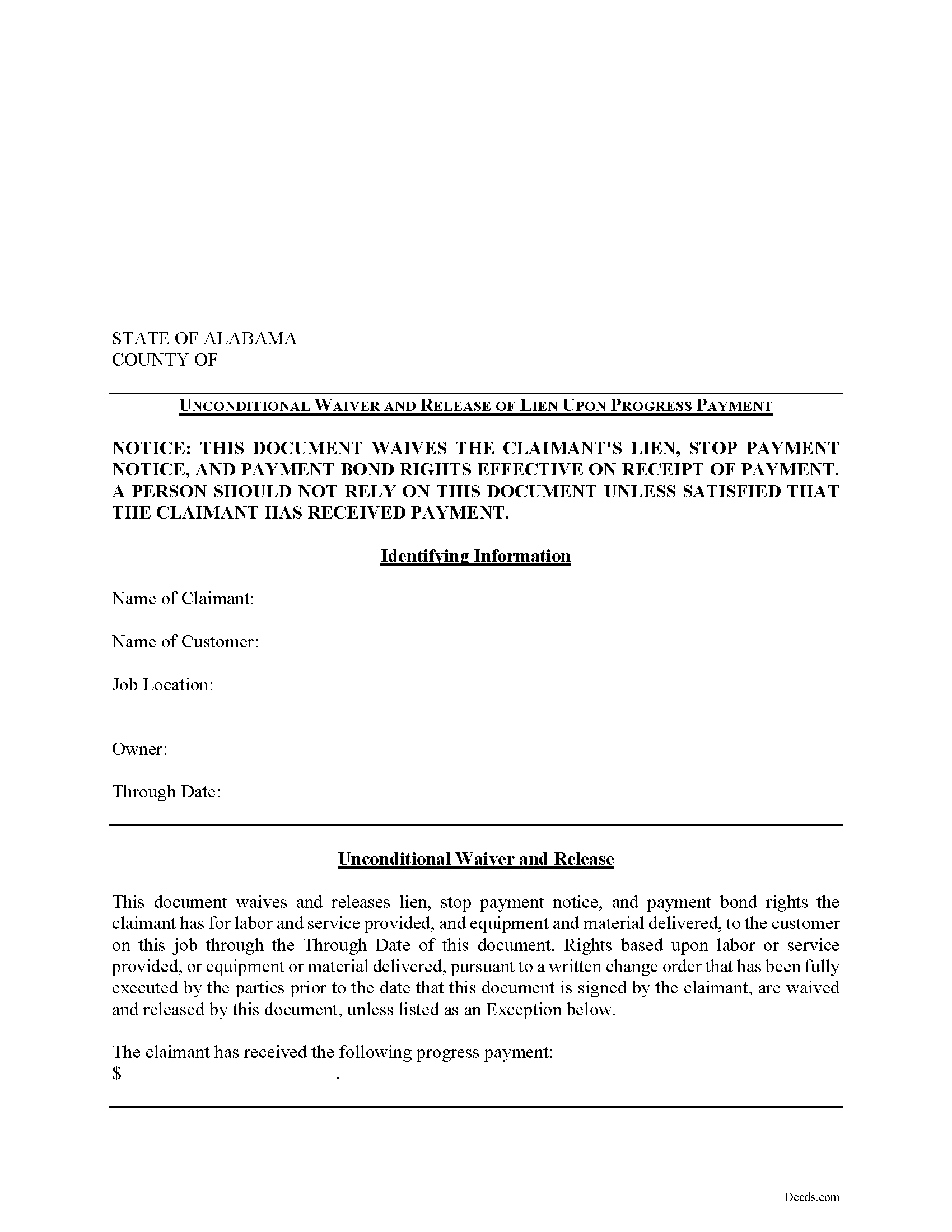
Alabama Unconditional Waiver and Release of Lien on Progress Payment
Alabama mechanic's liens are governed under Chapter 11 of the Alabama Property Code (Section 11). Throughout the construction process, potential claimants may elect to serve the property owner with a lien waiver in exchange for partial or full payment.
The term "waiver" refers to giving up a legal right. In this case, the person granting the waiver is giving up the right to seek a mechanic's lien for all or part of the amount due. This assurance is usually enough to get the other party to pay. In Alabama, there are no statutory forms for waivers, although according to the principles of contract law, the parties may agree to such modifications in writing.
Waivers generally come in four varieties: conditional or unconditional, and partial or final. A conditional waiver means the waiver is conditioned upon the claimant receiving the amount due, while unconditional waivers are effective regardless if payment is actually made. Partial waivers are used to waive a portion of lien rights for up to the partial or progress payment amount, and final waivers release all lien rights based on a customer's full payme... More Information about the Alabama Unconditional Lien Waiver on Progress Payment
Conditional Lien Waiver on Final Payment
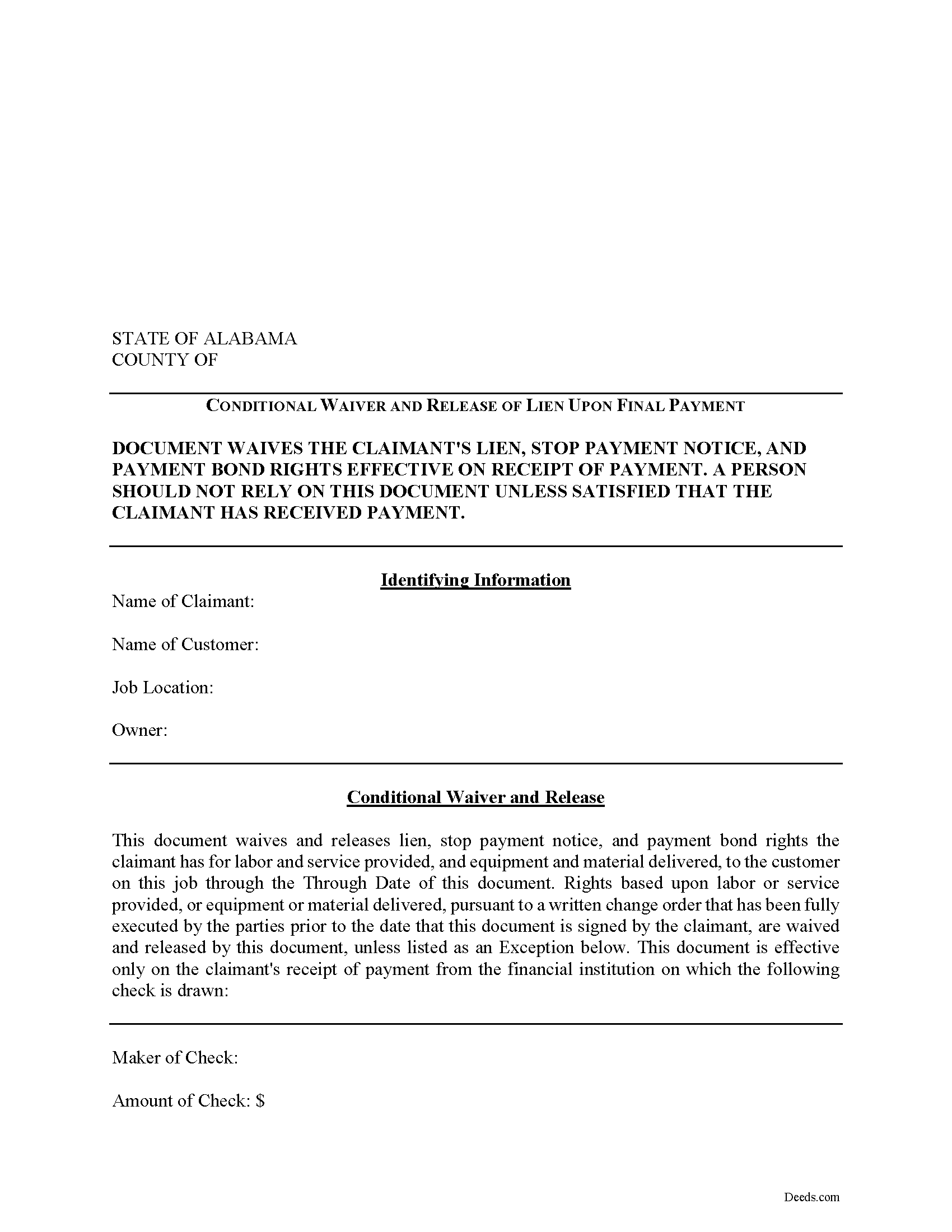
Alabama Conditional Waiver and Release of Lien on Final Payment
Alabama mechanic's liens are governed under Chapter 11 of the Alabama Property Code (Section 11). Throughout the construction process, potential claimants may elect to serve the property owner with a lien waiver in exchange for partial or full payment.
The term "waiver" refers to giving up a legal right. In this case, the person granting the waiver is giving up the right to seek a mechanic's lien for all or part of the amount due. This assurance is usually enough to get the other party to pay. In Alabama, there are no statutory forms for waivers although according to the principles of contract law, the parties may agree to such modifications in writing.
Waivers generally come in four varieties: conditional or unconditional, and partial or final. A conditional waiver means the waiver is conditioned upon the claimant receiving the amount due, while unconditional waivers are effective regardless if payment is actually made. Partial waivers are used to waive a lien for up to the partial or progress payment amount, and final waivers release all lien rights based on a customer's full payment.
Use a final condit... More Information about the Alabama Conditional Lien Waiver on Final Payment
Unconditional Lien Waiver on Final Payment
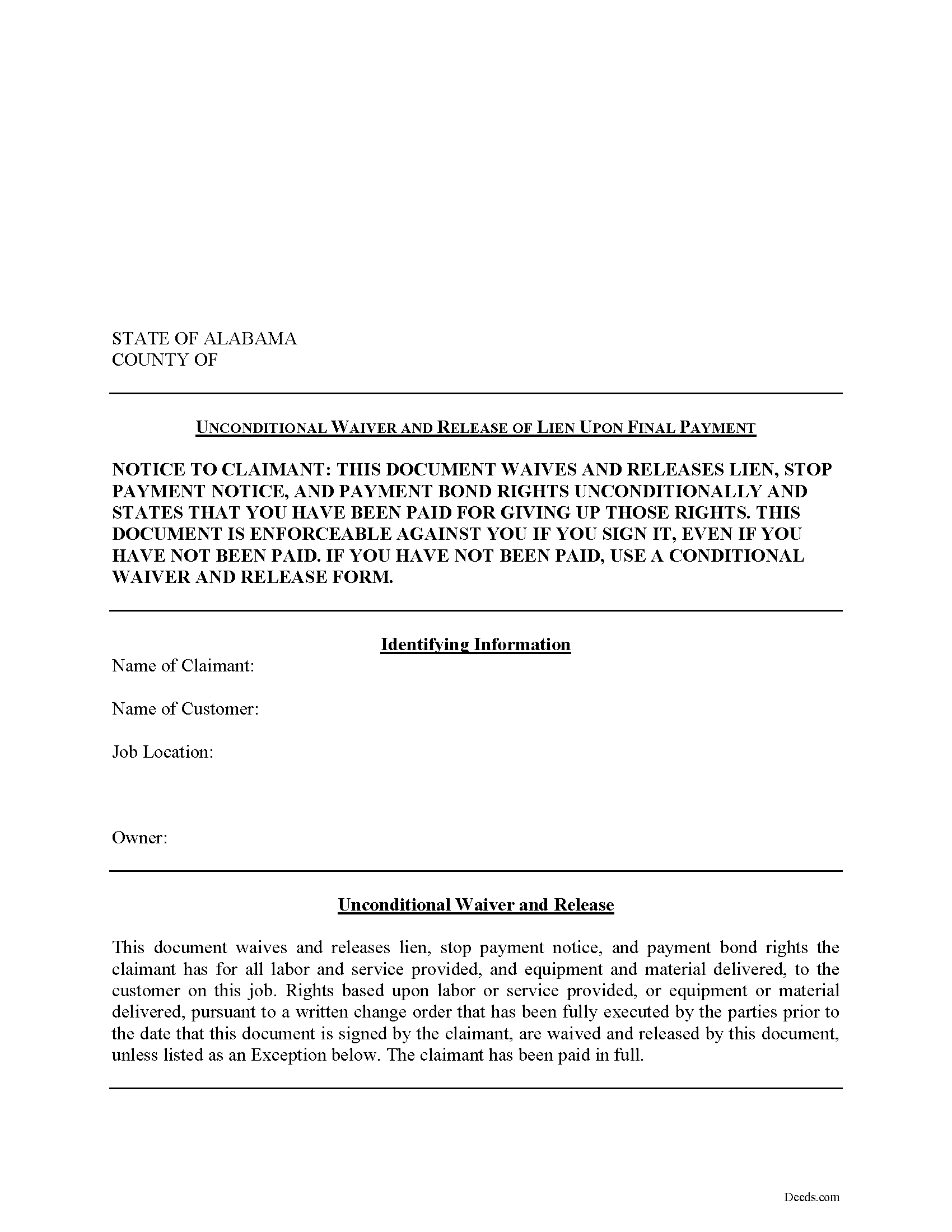
Alabama Unconditional Waiver and Release of Lien on Final Payment
Alabama mechanic's liens are governed under Chapter 11 of the Alabama Property Code (Section 11). Throughout the construction process, potential claimants may elect to serve the property owner with a lien waiver in exchange for partial or full payment.
The term "waiver" refers to giving up a legal right. In this case, the person granting the waiver is giving up the right to seek a mechanic's lien for all or part of the amount due. This assurance is usually enough to get the other party to pay. In Alabama, there are no statutory forms for waivers although according to the principles of contract law, the parties may agree to such modifications in writing.
Waivers generally come in four varieties: conditional or unconditional, and partial or final. A conditional waiver means the waiver is conditioned upon the claimant receiving the amount due, while unconditional waivers are effective regardless if payment is actually made. Partial waivers are used to waive a lien for up to the partial or progress payment amount, and final waivers release all lien rights based on a customer's full payment.
Use the final un... More Information about the Alabama Unconditional Lien Waiver on Final Payment
Lis Pendens
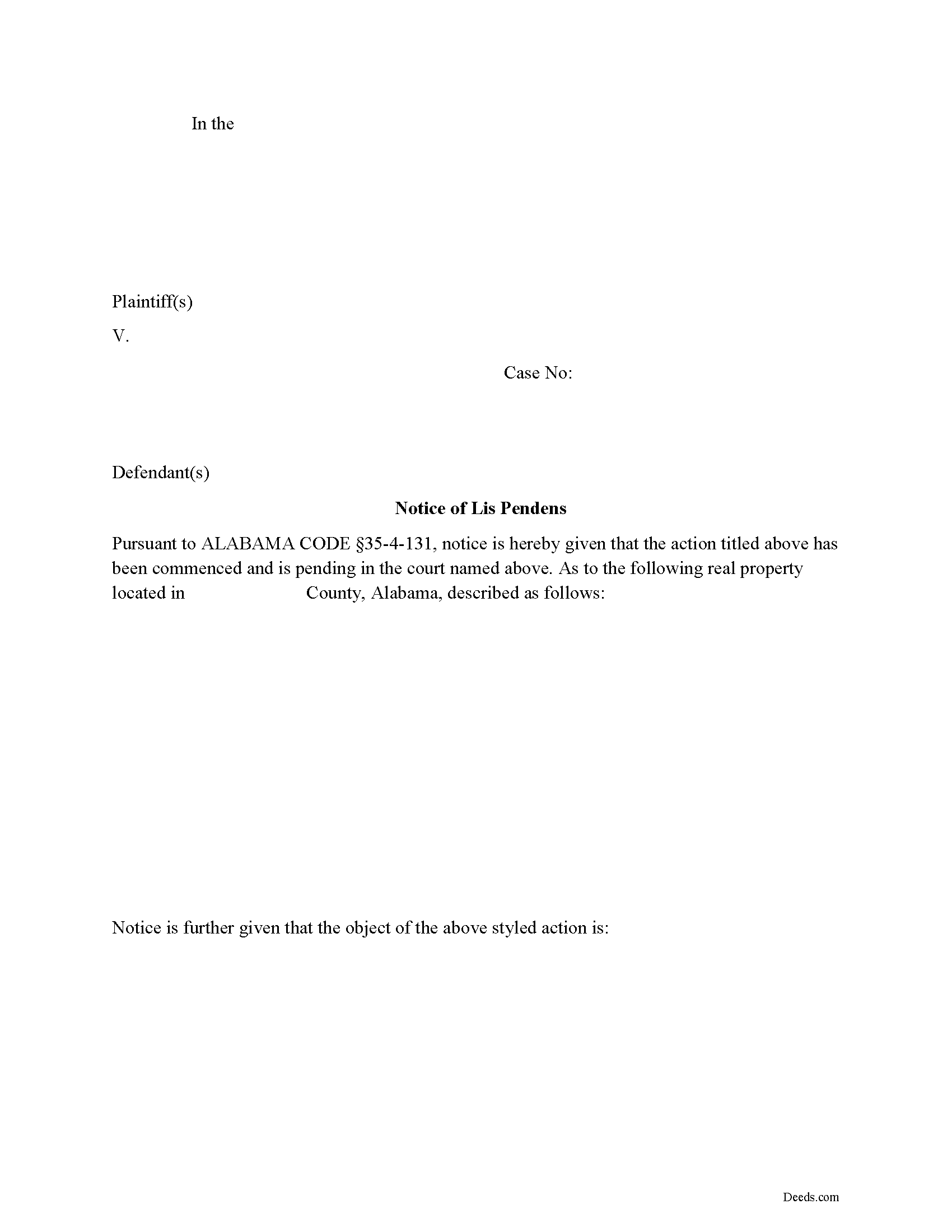
"Lis Pendens" Latin for "Pending Suit". A Lis Pendens is recorded at the probate court when the essence of the matter is related to real property described in the Lis Pendens. In the case of a Mechanics Lien, the Lis Pendens is filed after the judgement has been proclaimed and foreclosure is started. The foreclosure affects title to the property. In a divorce case, if one spouse owns the property solely, a Lis Pendens is often filed to prevent the sale of said property before the divorce is settled. When a purchaser of property does a title search and sees a Lis Pendens, they know that there is pending litigation, and if they purchase the property they would be held to the outcome of the litigation. Imagine buying a house and the settled litigation says one spouse gets $90,000 for their equity in the house. A buyer could be held to that outcome since they purchased with a Lis Pendens Notice attached. An Alabama Lis Pendens states: The court of the pending case, county of the pending case, case number, object of case, Plaintiff (person(s) filing the case), and Defendant (Person(s) defending the case). Many times, a case has multiple plaintiffs and/or defendants, which need to be lis... More Information about the Alabama Lis Pendens
Lis Pendens Release
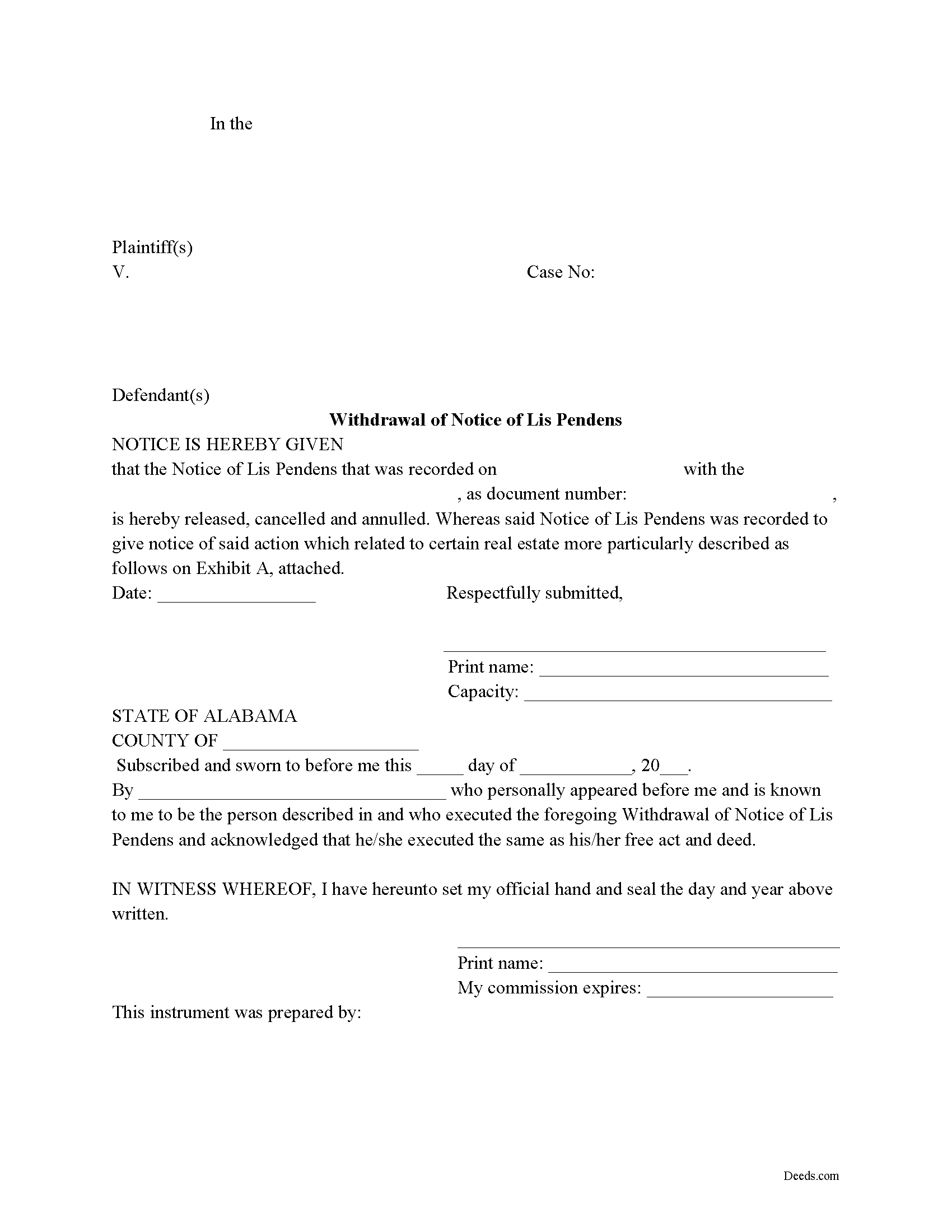
When to Release/Withdraw a Lis Pendens in Alabama
A lis pendens is filed to give notice that a suit is pending on a specific property. That notice is filed in probate court, in the county(s) where the land is located. Upon settlement or termination of the case and by court order it is customary to file a "Withdrawal of Lis Pendens" document. Usually within 30 days of such event. [See Alabama Code 35-4-136. Record of termination of action.]
(Alabama Release of Lis Pendens Package includes form, guidelines, and completed example)... More Information about the Alabama Lis Pendens Release
Affidavit of Surviving Joint Tenant
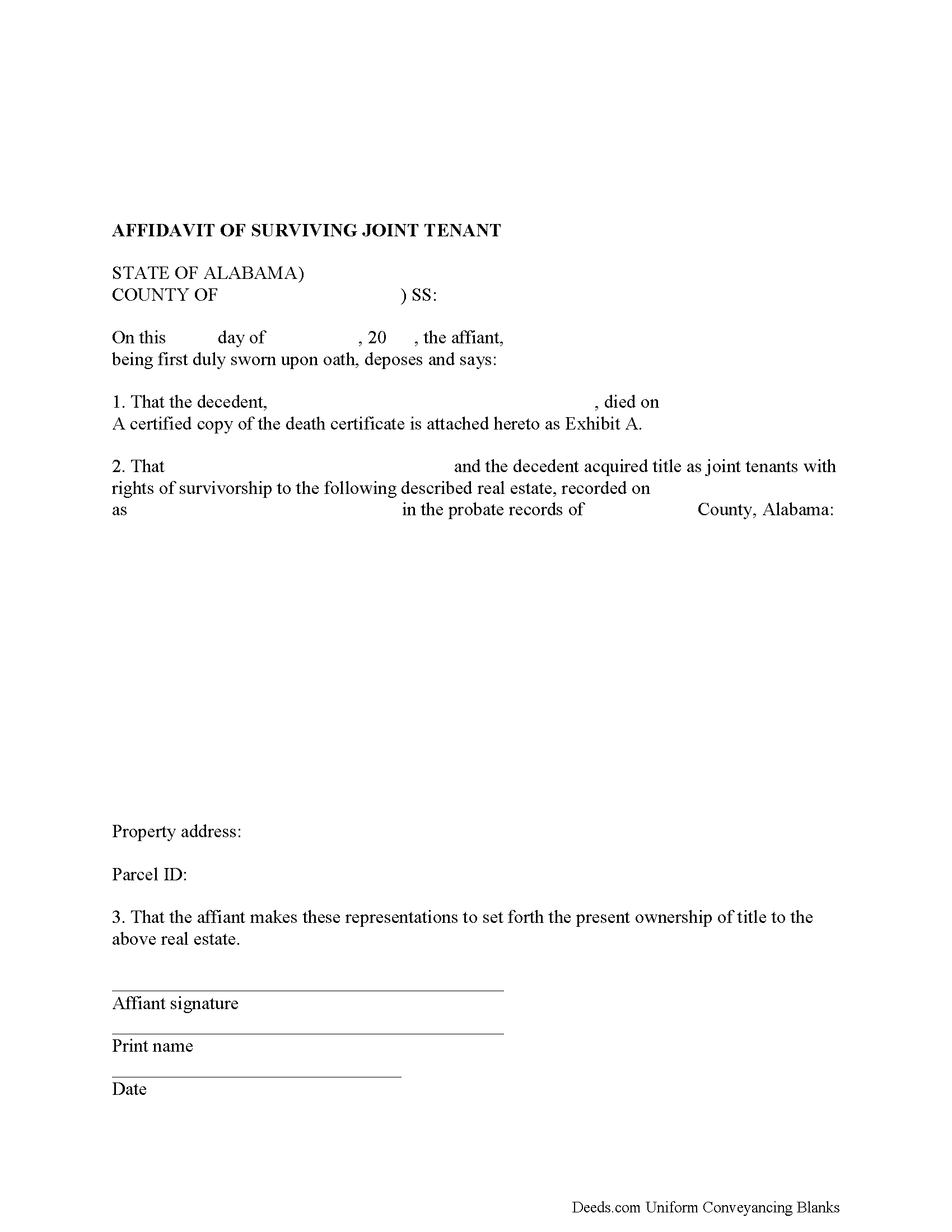
Alabama law allows two or more people to share title to real property as either tenants in common or as joint tenants. One aspect of joint tenancy in many states is the right of survivorship, which causes the shares of a deceased co-owner to be distributed amongst the surviving owners as a function of law, without the need for probate.
In Alabama, however, when "one joint tenant dies before the severance, his interest does not survive to the other joint tenants but descends and vests as if his interest had been severed and ascertained [as with tenancy in common]; provided, that in the event it is stated in the instrument creating such tenancy that such tenancy is with right of survivorship or other words used therein showing such intention, then, upon the death of one joint tenant, his interest shall pass to the surviving joint tenant or tenants according to the intent of such instrument." (ALA CODE 35-4-7). To restate this more simply, Alabama joint tenancy functions like a tenancy in common (separate shares of the whole) unless the intent for survivorship is clearly stated in the text of the deed.
Assuming the intent for survivorship is established and a co-owner dies, h... More Information about the Alabama Affidavit of Surviving Joint Tenant
Disclaimer of Interest
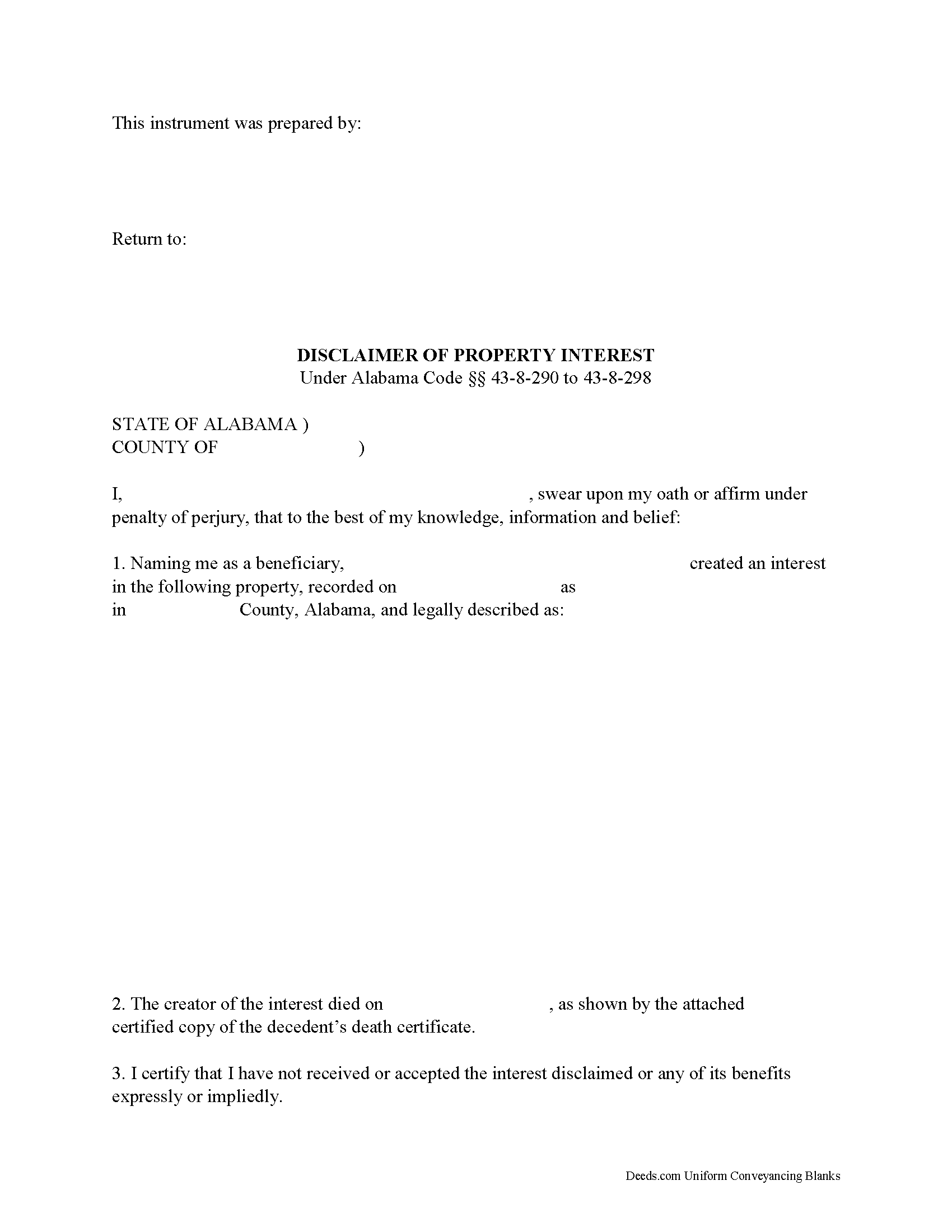
As part of the Alabama Code, the beneficiary of an interest in property may renounce the gift, either in part or in full (Ala. Code 43-8-290 to 43-8-298). Note that the option to disclaim is only available to beneficiaries who have not acted in any way to indicate acceptance or ownership of the interest ( 43-8-295).
The disclaimer must be in writing and include a description of the interest, a declaration of intent to disclaim all or a defined portion of the interest, and be signed by the disclaimant ( 43-8-293).
File the disclaimer within nine months of the transfer (e.g., the death of the creator of the interest) with the probate court of the county that has jurisdiction over proceedings regarding the estate of the deceased donor. In addition, deliver a copy of the disclaimer in person or send it by registered mail to any personal representative or other fiduciary of the decedent's estate ( 43-8-292(a)). If the transfer was enacted by an instrument other than a will, deliver a copy of the disclaimer to the trustee or the person who has legal title to or possession of the property ( 43-8-292(b)). If real property is involved, record a copy of the disclaimer in the office... More Information about the Alabama Disclaimer of Interest
Certificate of Trust
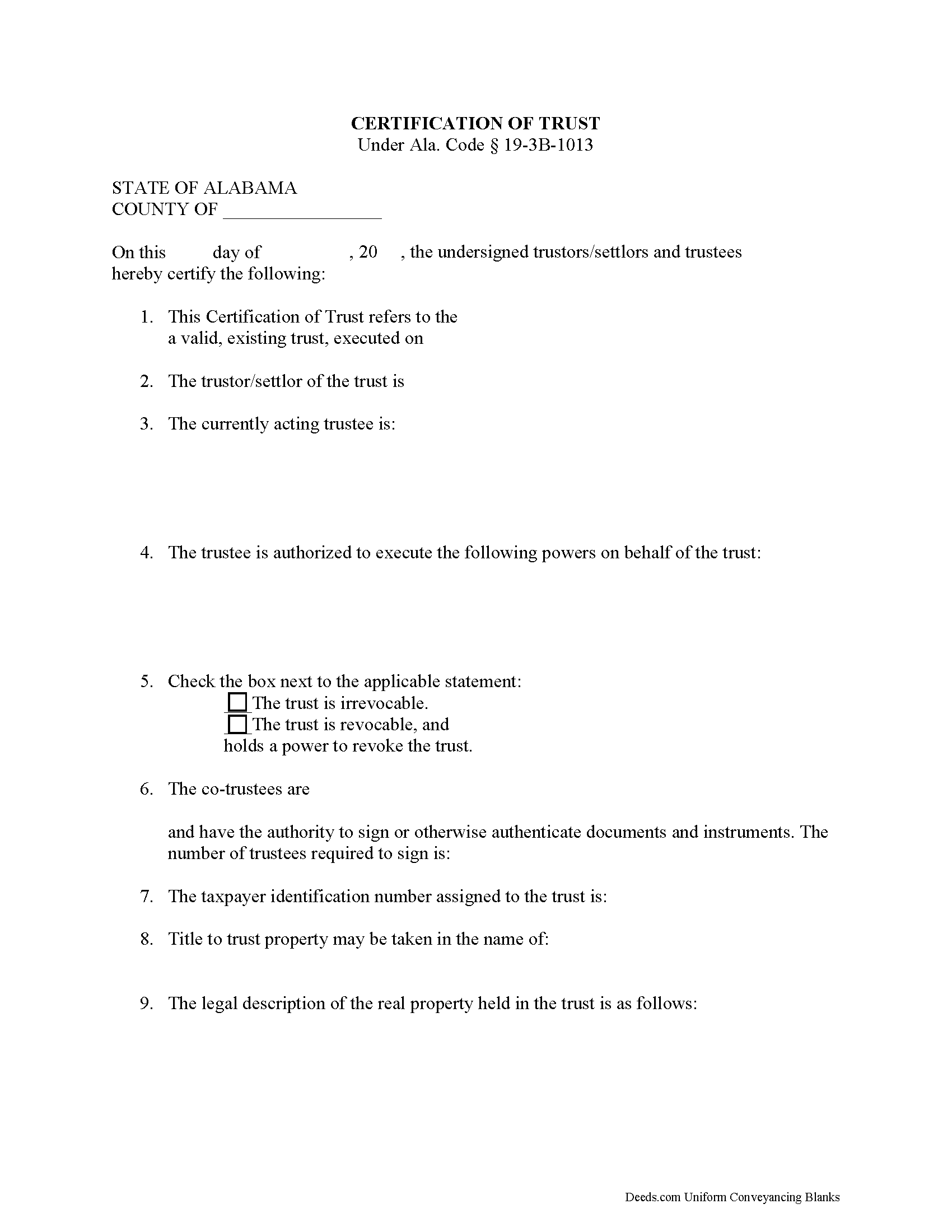
Ala. Code 19-3B-1013 outlines the requirements for a certification of trust in the State of Alabama.
When acquiring property in the name of a trust or transferring property to a trust, the bank or escrow company approving the transfer requires confirmation of the trustee's authority to act. Instead of furnishing a copy of the original trust, which may contain personal information, a trustee can provide a document called a certification of trust, or trust certificate, to avoid disclosing personal information to someone who is not a beneficiary of the trust.
The certification of trust acts as evidence of the existing trust, and verifies the trustee's status to act on its behalf. According to the law, the recipient of the certification of trust may also require the trustee to furnish excerpts from the original trust and later amendments that designate the trustee and enumerate the trustee's powers. However, a certificate of trust is sufficient documentation to establish the trustee's liability for the existence of the facts contained in the certification.
(Alabama Certificate of Trust Package includes form, guidelines, and completed example) Contact a lawyer with any questio... More Information about the Alabama Certificate of Trust
Mortgage
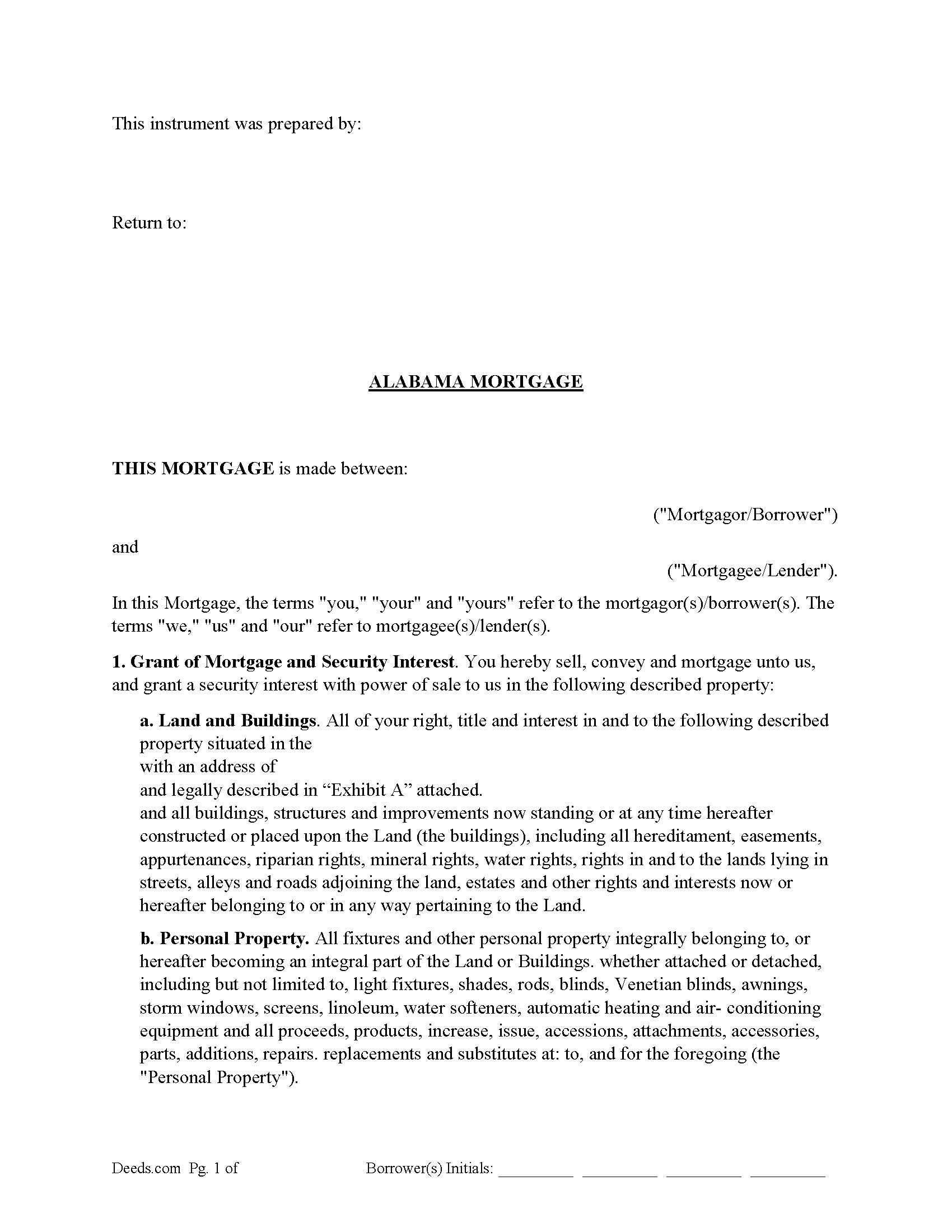
The short definition of a mortgage is that it's a loan used to purchase real property. In Alabama, the mortgage is comprised of two parts: the security instrument and the promissory note. A security instrument is a specific type of document that provides security for the lender and contains terms (agreements) that apply until the buyer (borrower) repays the lender according to terms defined in an attached promissory note.
While the lender holds legal title to the property during this time, the borrower holds equitable title, which means they may occupy the property as if they hold legal title, but until the loan has been repaid, the lender actually owns it. This is because mortgages involve a lien against the property, held as security, that ends when the debt is repaid, and the owner assumes legal title (after recording a release of mortgage).
The buyer must also complete a promissory note. A promissory note is a negotiable instrument that contains an unconditional written promise, signed by the borrower, to repay the lender or its designated agent. It defines the amount and specific terms of the loan between the borrower and the lender and must be completed at the same tim... More Information about the Alabama Mortgage
Assignment of Mortgage
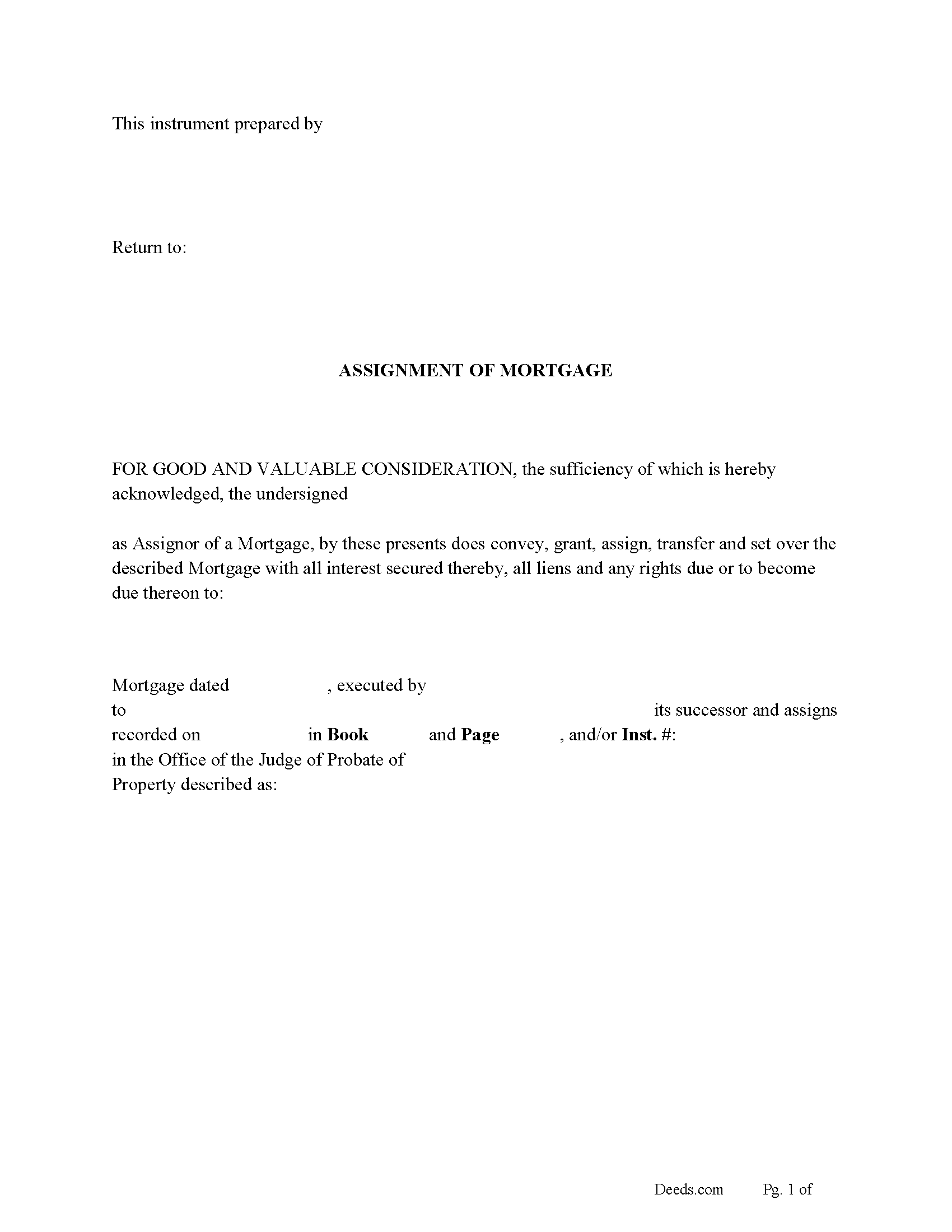
This is a recorded document used to assign a previously recorded mortgage to another party, this is typically done when a mortgage has been sold or through administration of estates. Included is a "Notice of Assignment of Mortgage" form, by law the current borrowers must be notified of the mortgage assignment.
Title 43 - WILLS AND DECEDENTS' ESTATES.
Chapter 2 - ADMINISTRATION OF ESTATES.
Article 16 - Sale of Personal Property.
Section 43-2-420 - Assignment or transfer of mortgages, notes or accounts.
Executors and administrators may assign and transfer by endorsement, without recourse or warranty, any mortgages, notes or accounts belonging to a decedent, provided he receives the full amount due thereon, and provided said mortgages, notes or accounts shall have been entered on the inventory returned to the court.
For use in Alabama only.
... More Information about the Alabama Assignment of Mortgage
Full Release of Mortgage
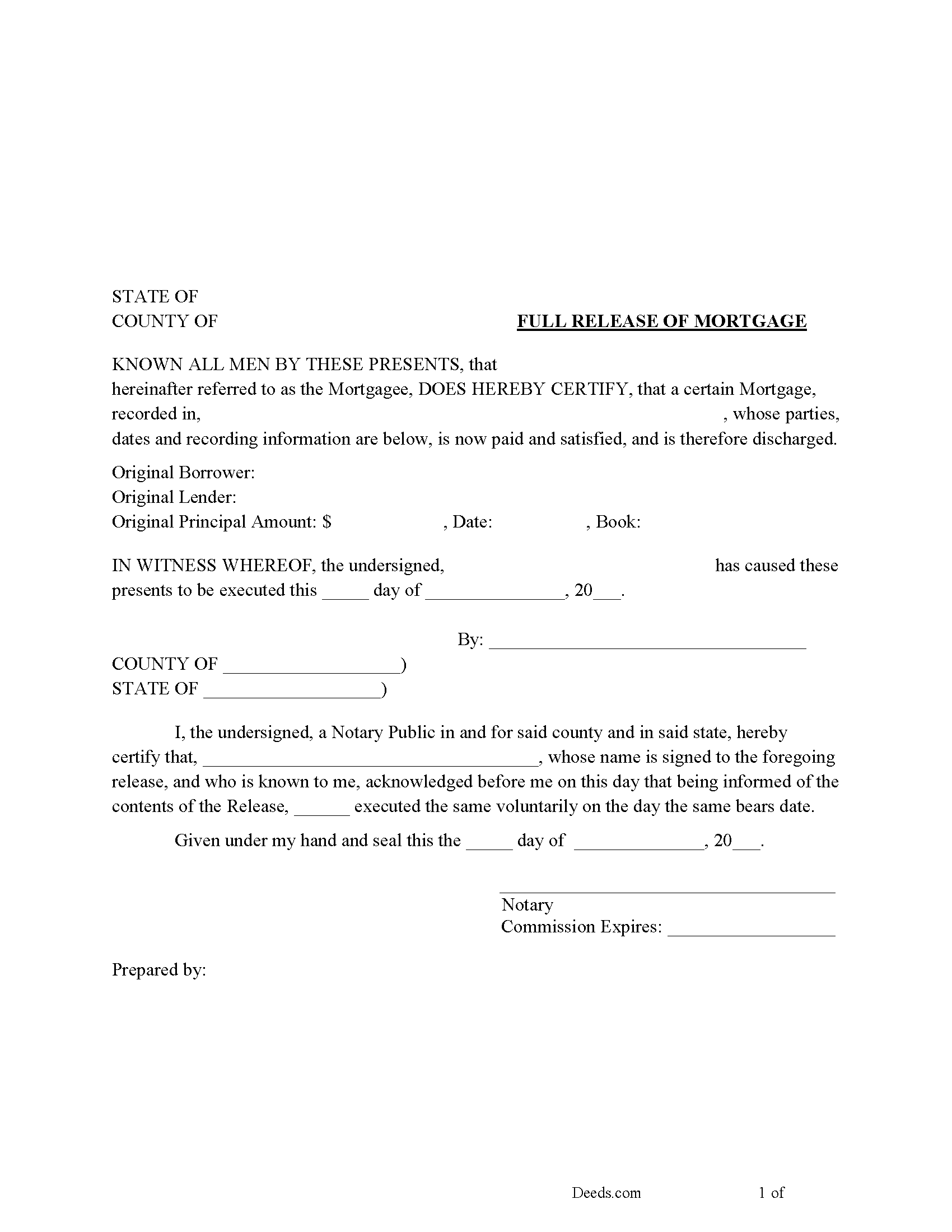
Use this form to release a Mortgage that has been satisfied and/or paid in full. The lender/secured creditor shall record a satisfaction within 30 days after the lender receives full payment and performance of the secured mortgage. If a satisfaction is not sent to the mortgagors/borrowers, the lender ((a) is liable to the mortgagors for five hundred dollars ($500)) [and any actual economic damages directly caused by the failure to comply with this section.] (Section 35-10-92(c)) [Section 35-10-92(d)]
(The satisfaction in full by any one of several joint) lenders/(mortgagees, or his successors or assigns, on the margin of the record, and properly attested by the probate judge, or his chief clerk, or the filing of a release) of mortgage (by such party properly notarized, acknowledging full satisfaction of any mortgage in the names of two or more persons jointly as) lenders/(mortgagees standing on the probate records of any county in) the State of Alabama, (shall be sufficient to extinguish the lien of such mortgage.) (Section 35-10-28)
(Alabama Release of Mortgage Package includes form, guidelines, and completed example)
... More Information about the Alabama Full Release of Mortgage
Assignment of Rents and Leases
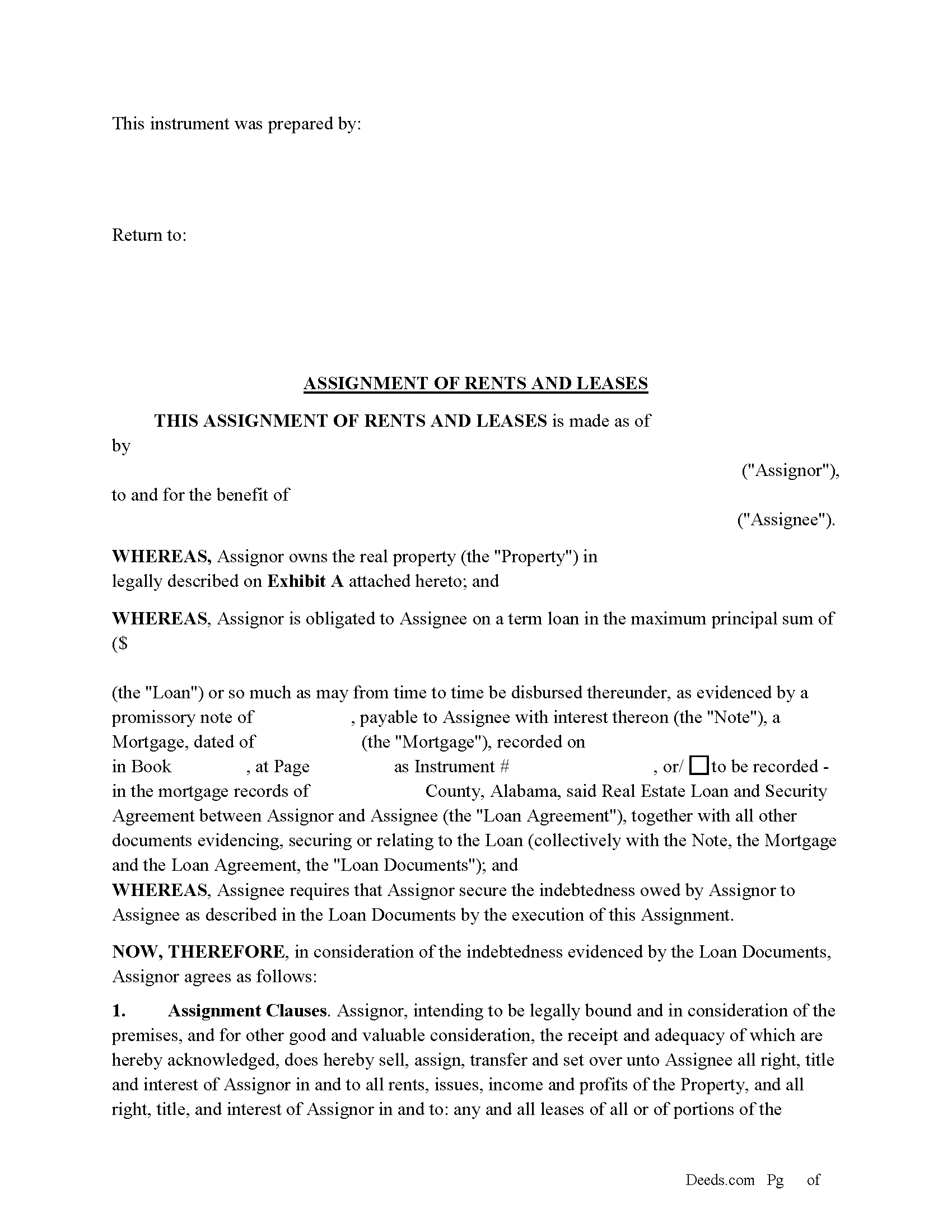
In this form the Assignor/borrower is allowed to collect the rent until an Event of Default, as defined in the subject Loan Agreement, Assignee/lender may, at its option, and without regard to the value of the Property or the adequacy of the security for the indebtedness, either in person or by agent, with or without bringing any action or proceeding, or by a receiver to be appointed by a court, enter upon, take possession of, manage and operate the Property or any part thereof, do any acts which Assignee deems proper to protect the Property and the Leases, and either with or without taking possession of the Property in the name of Assignor or in its own name, sue for or otherwise collect and receive such rents, issues, income and profits, including those past due and unpaid, and apply the same, less costs and expenses of operation and collection, including, but not being limited to, reasonable attorneys' fees, management fees and brokers' commissions, upon any indebtedness of Assignor to Assignee described in the Loan Documents, and in such order as Assignee may determine. Assignee reserves, within its own reasonable discretion, the right to determine the method of collection and... More Information about the Alabama Assignment of Rents and Leases
Release of Assignment of Rents and Leases
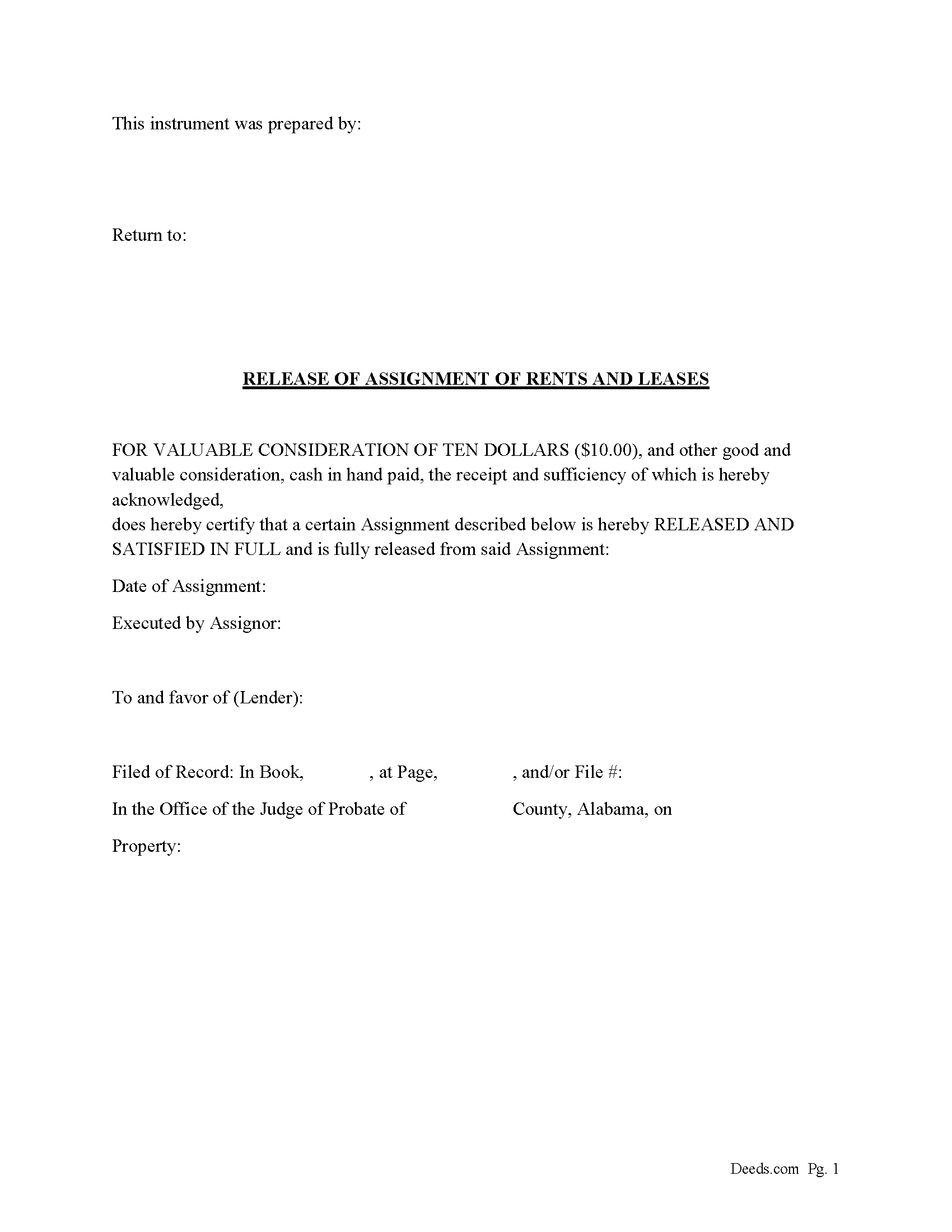
This form is used to release a previously recorded "Assignment of Rents and Leases" instrument, typically executed by the lender or lender's representative, when the subject mortgage is paid in full.
(Alabama Release Package includes form, guidelines, and completed example) For use in Alabama only.
... More Information about the Alabama Release of Assignment of Rents and Leases